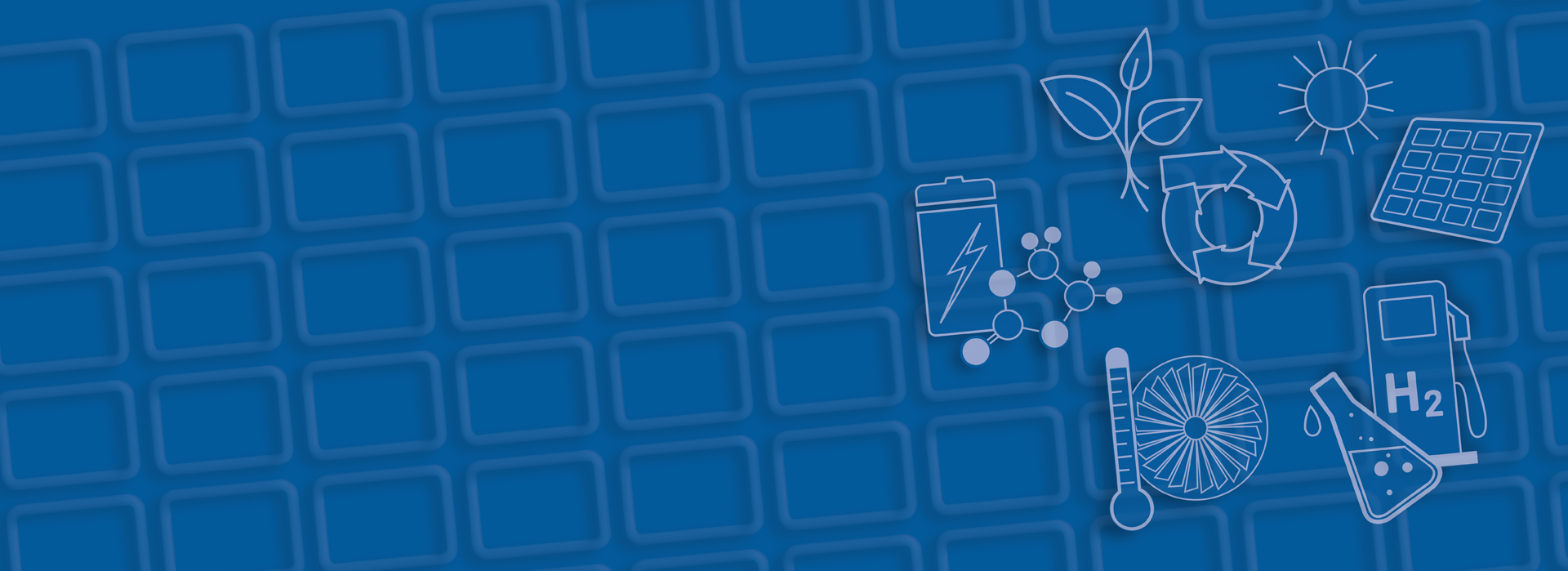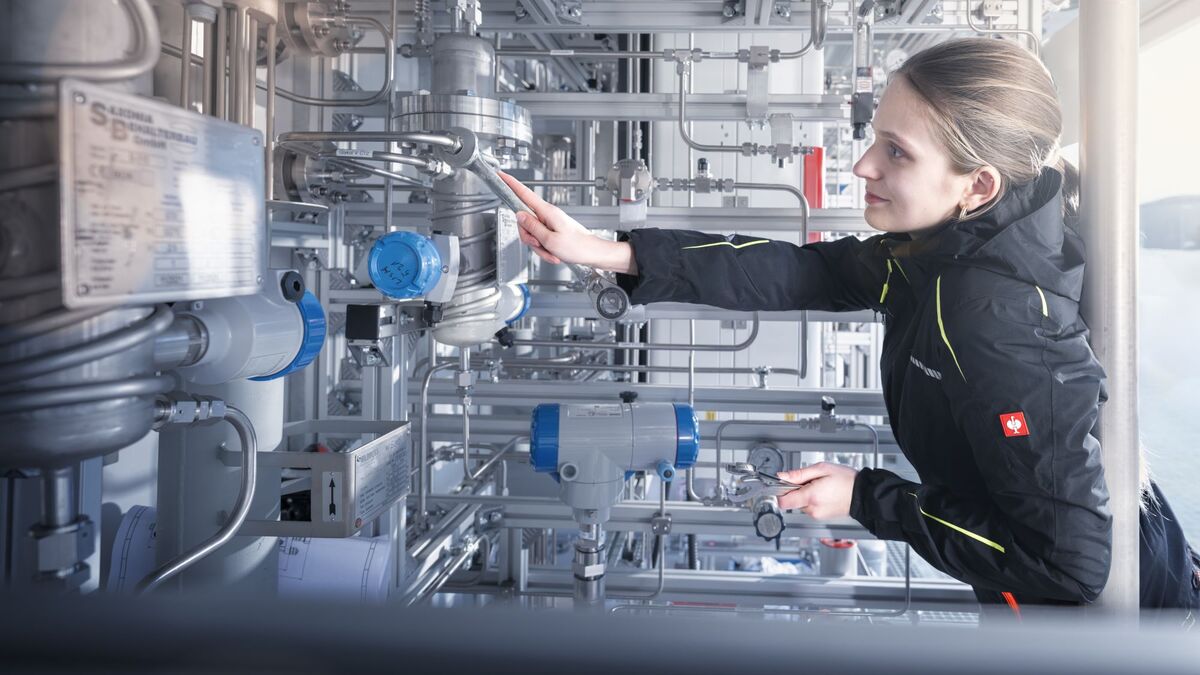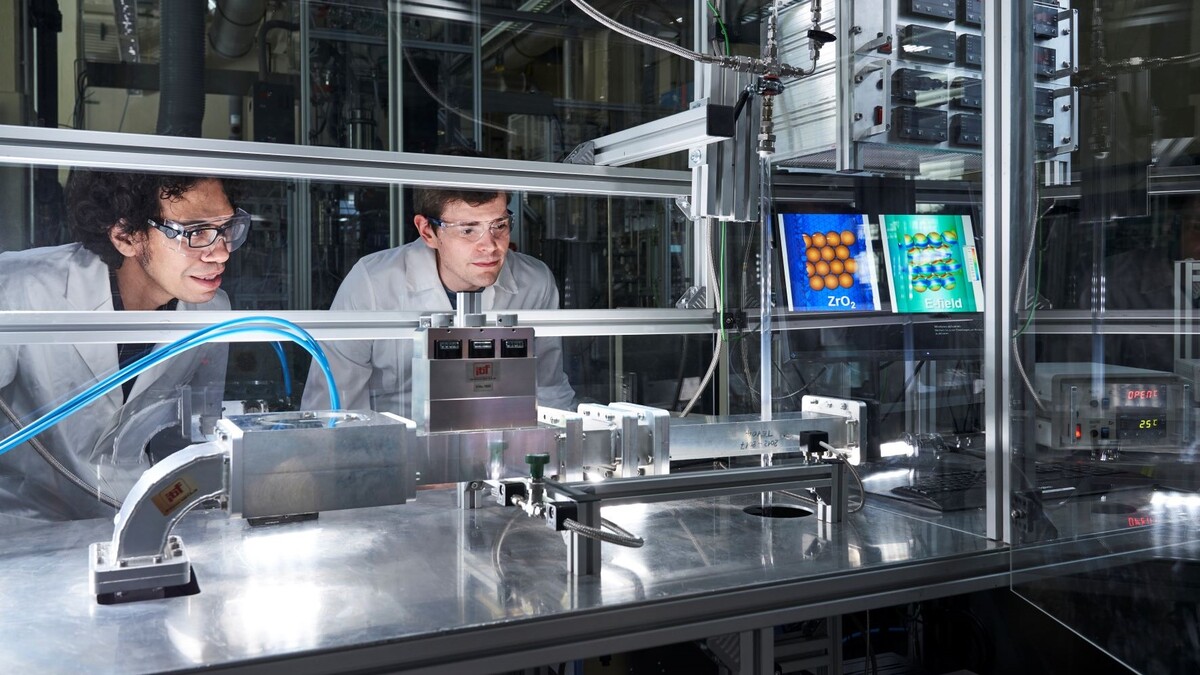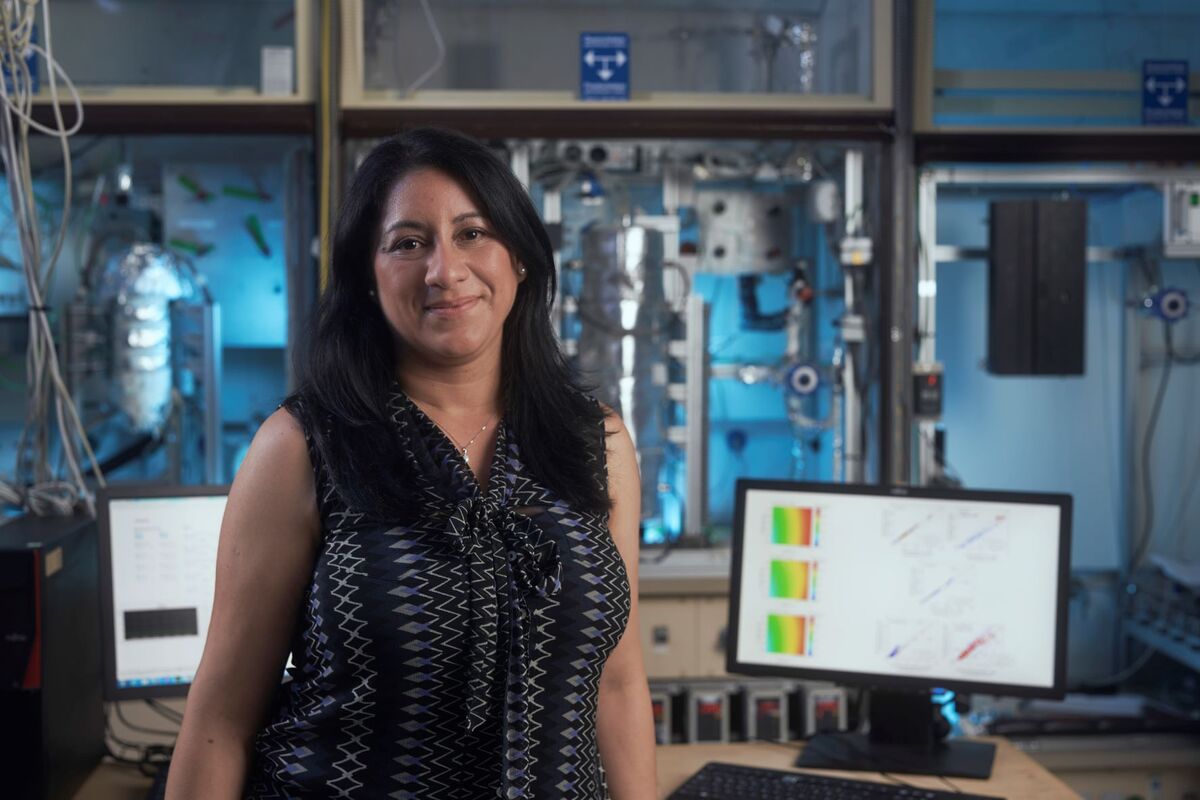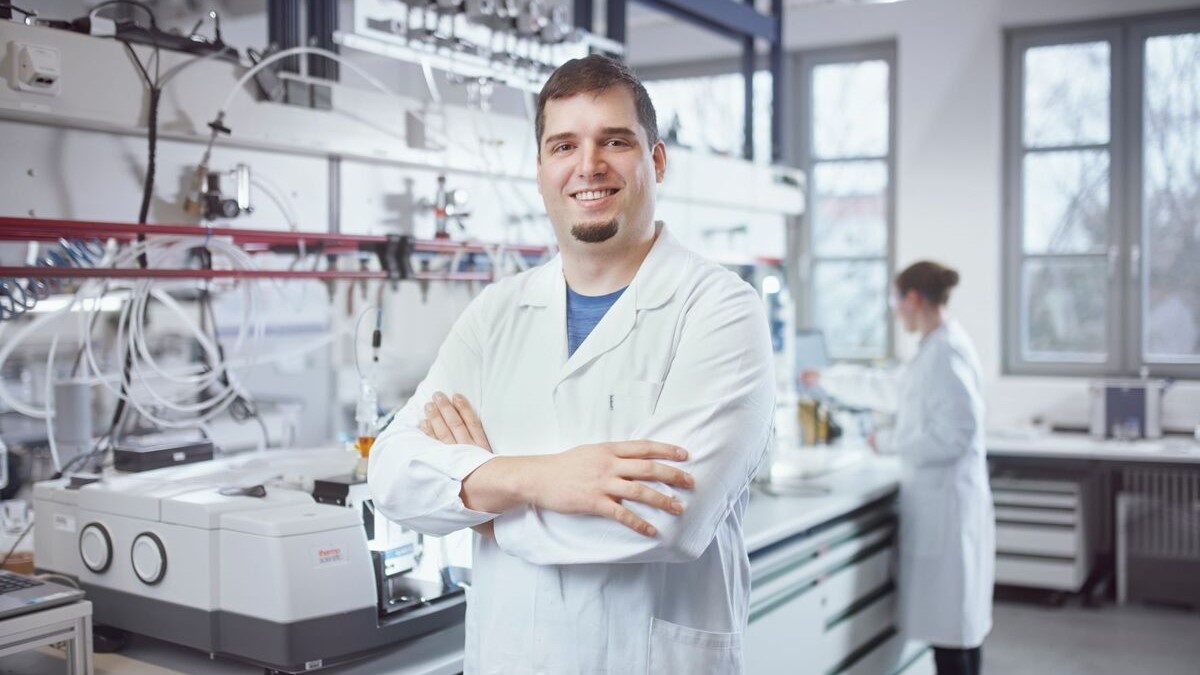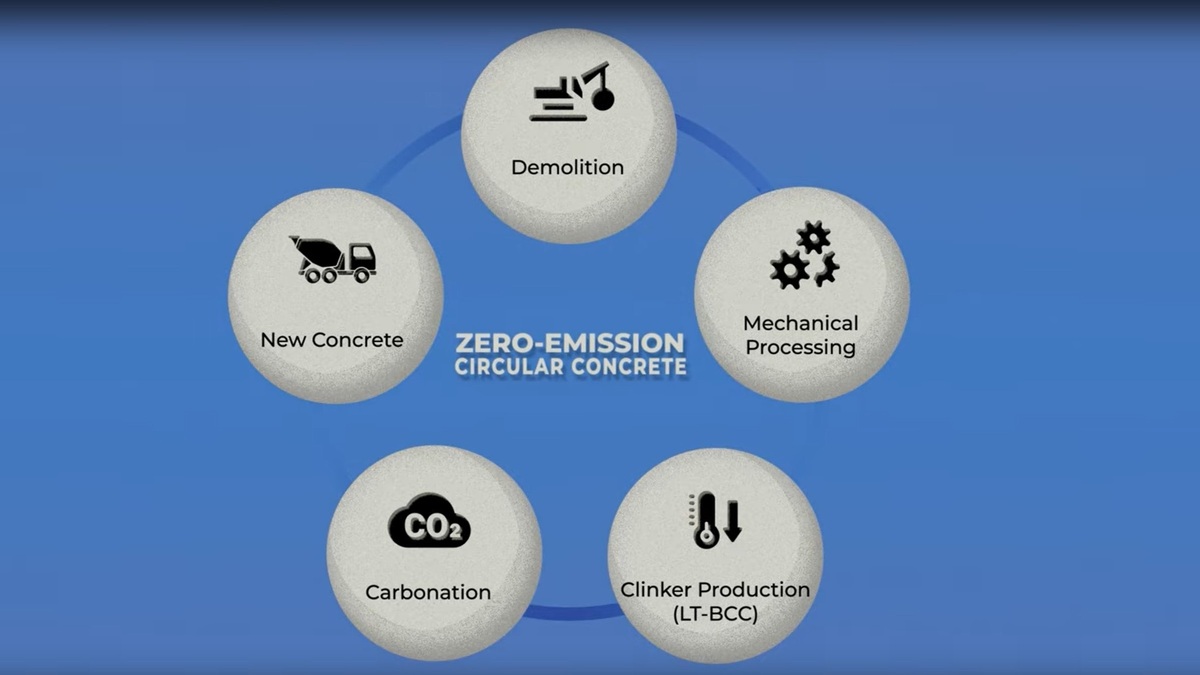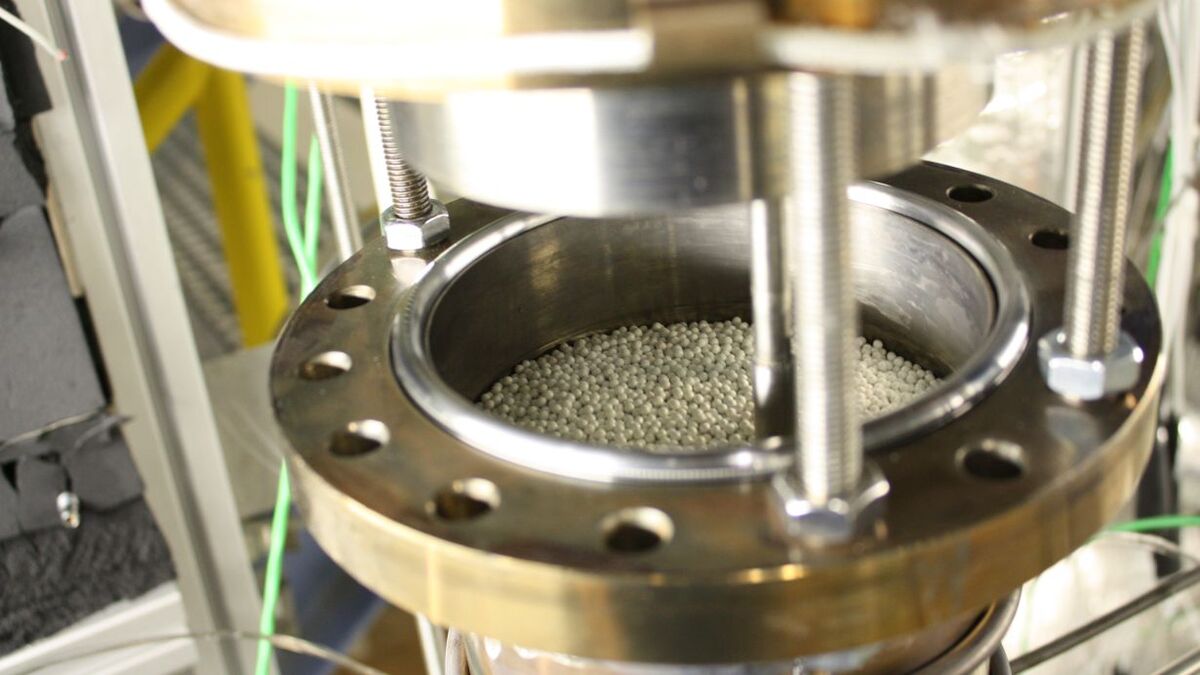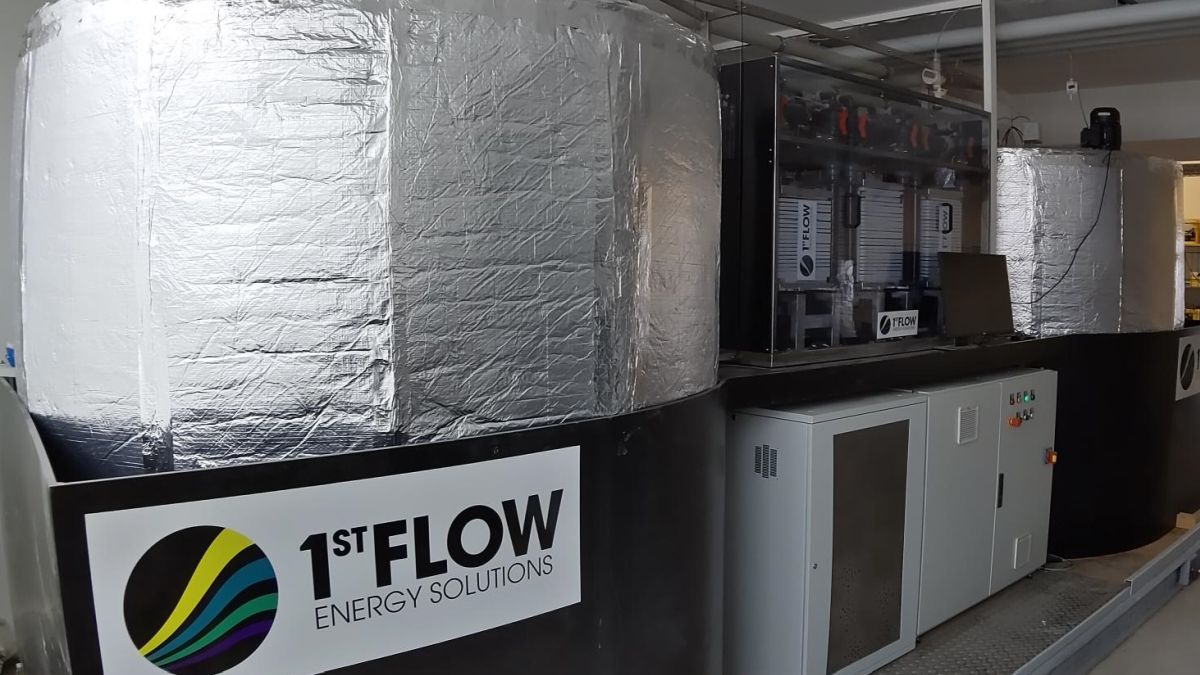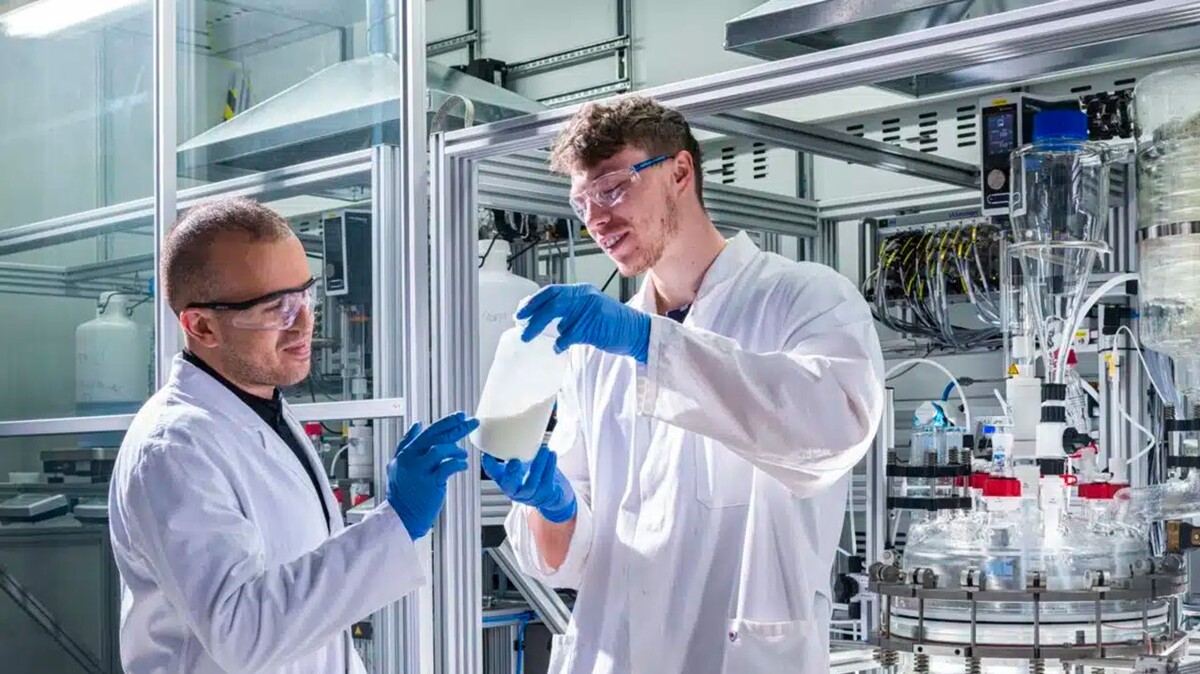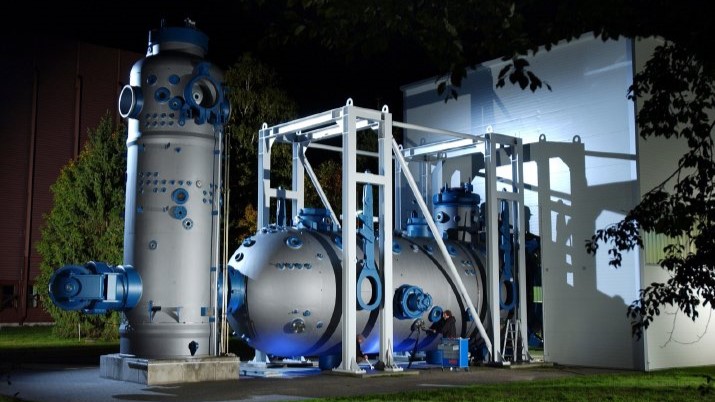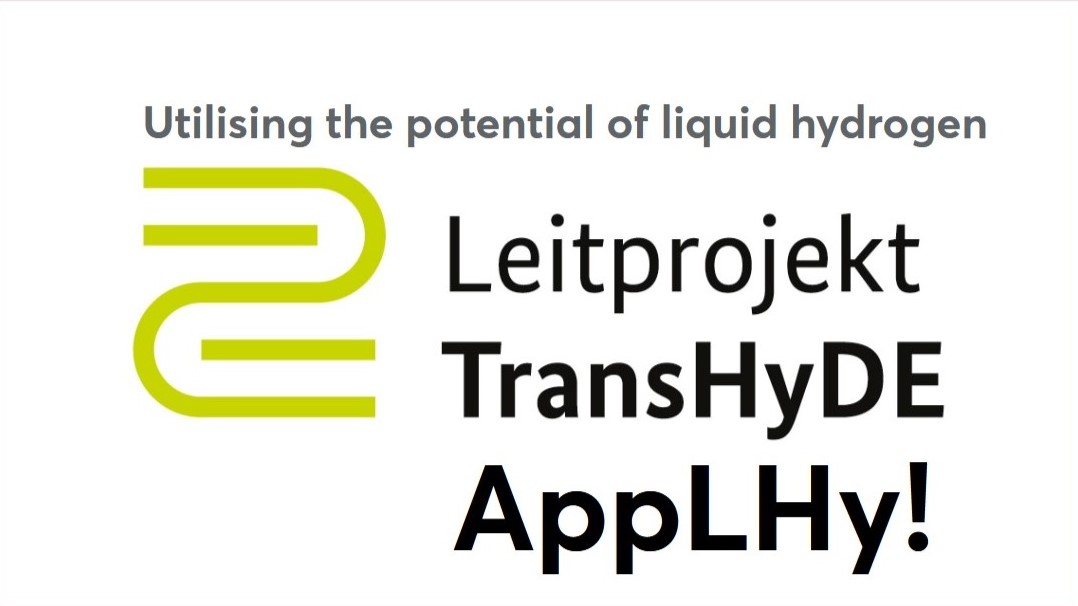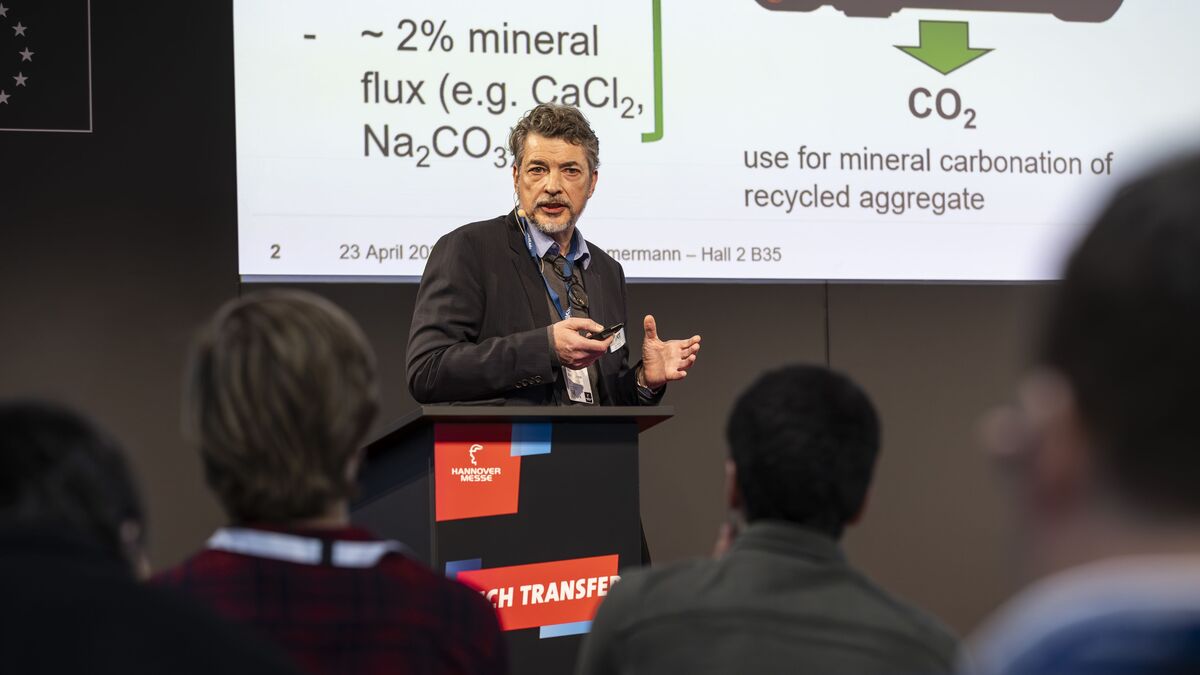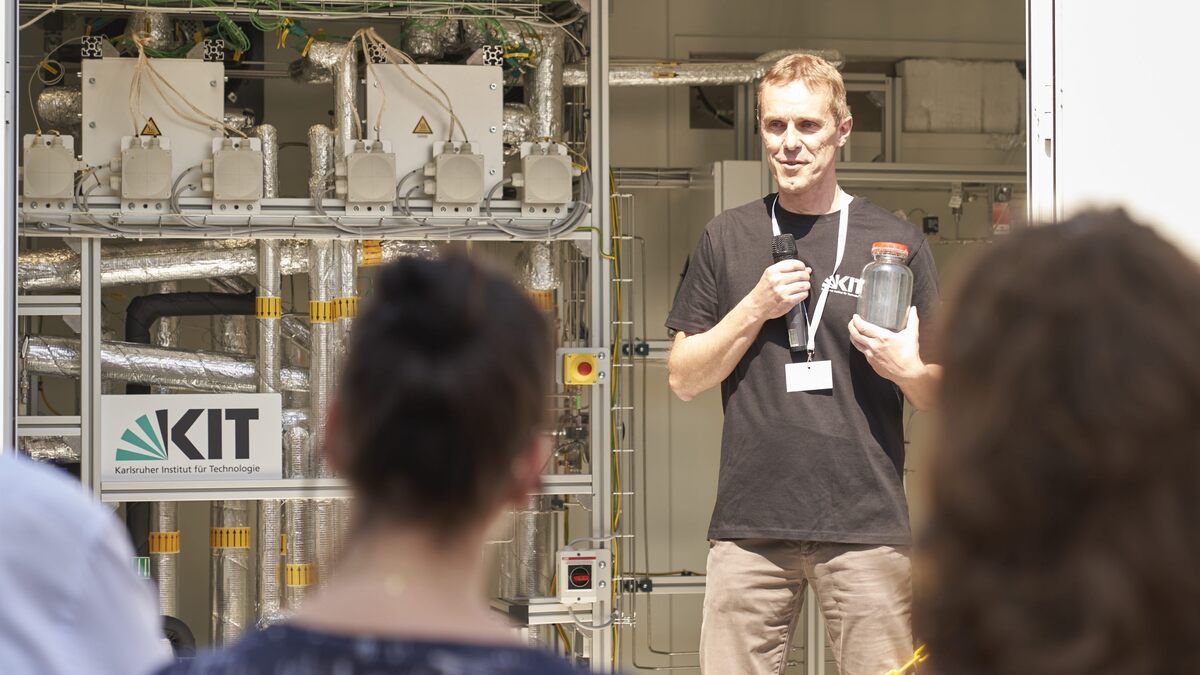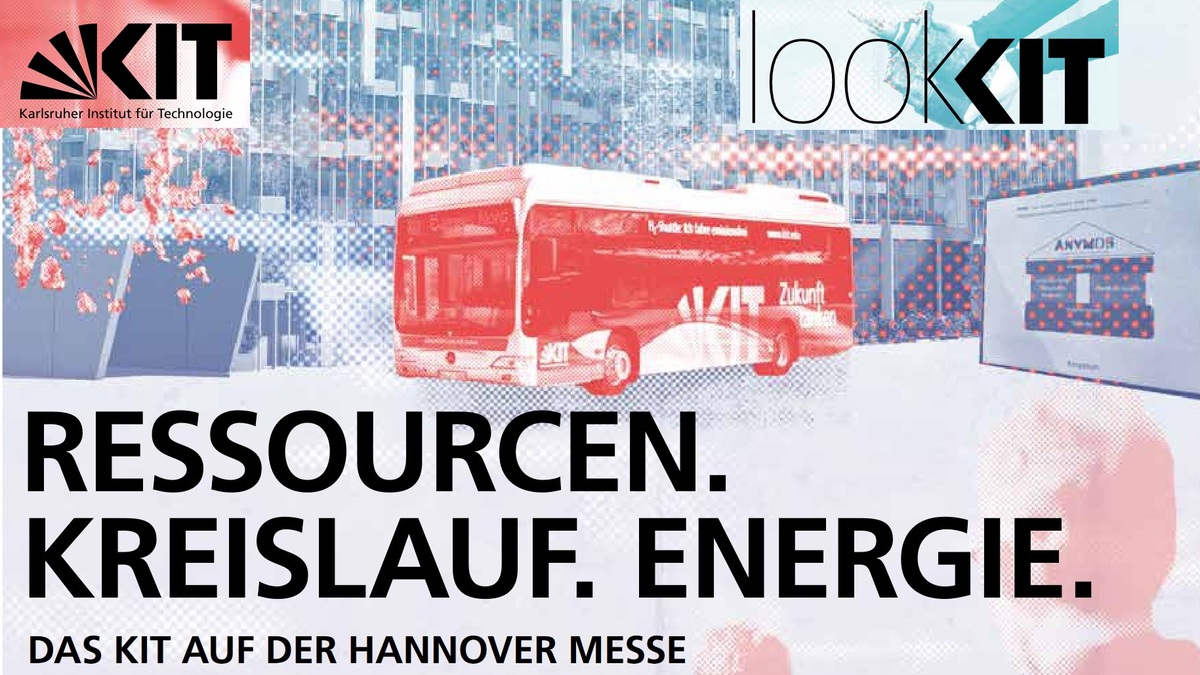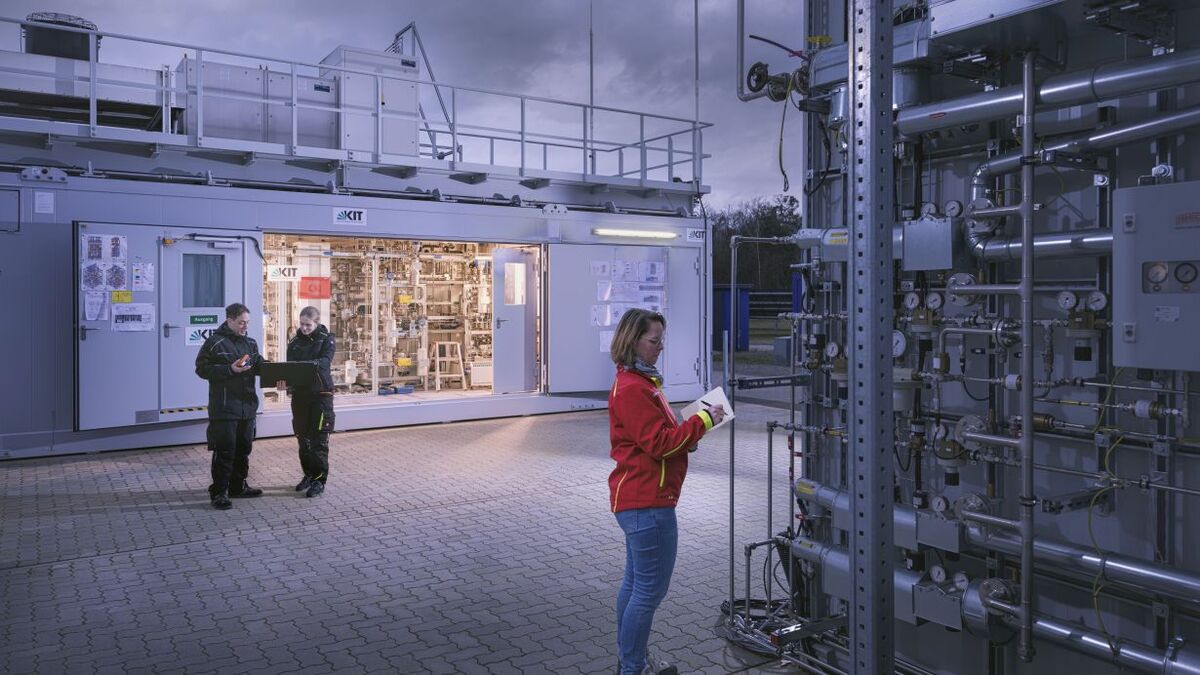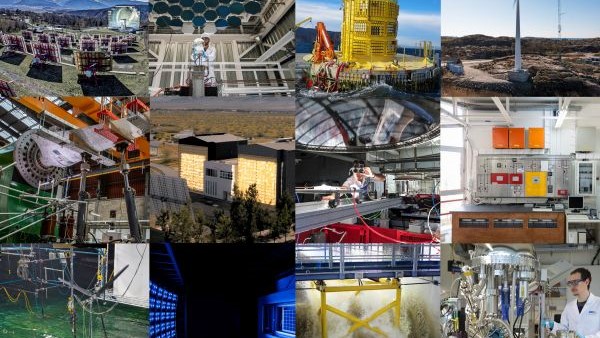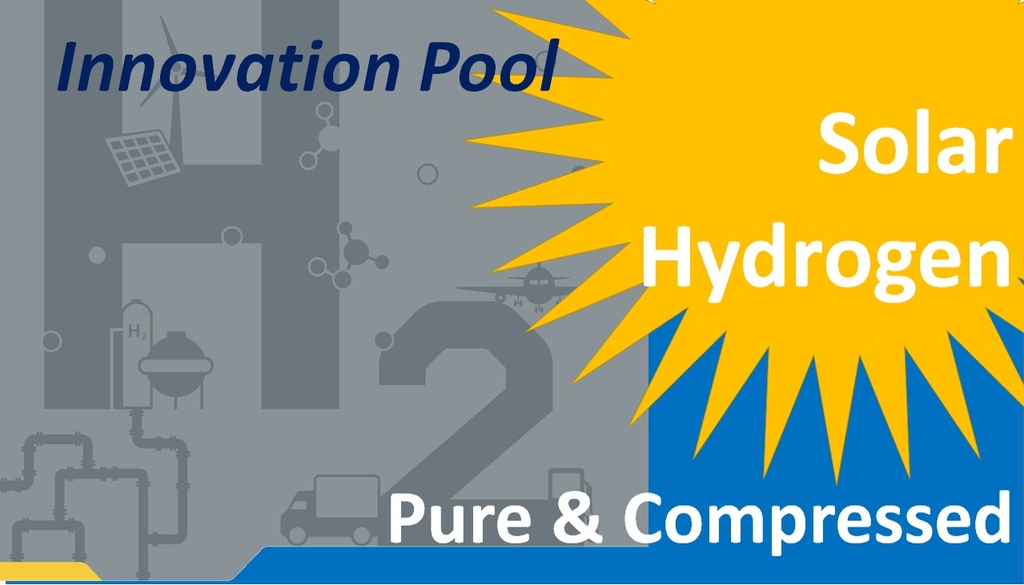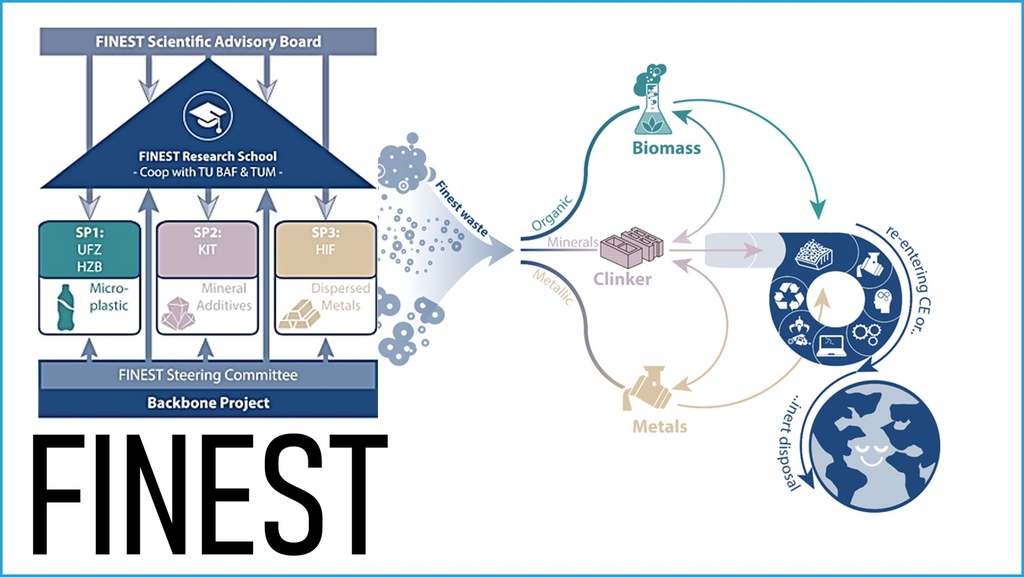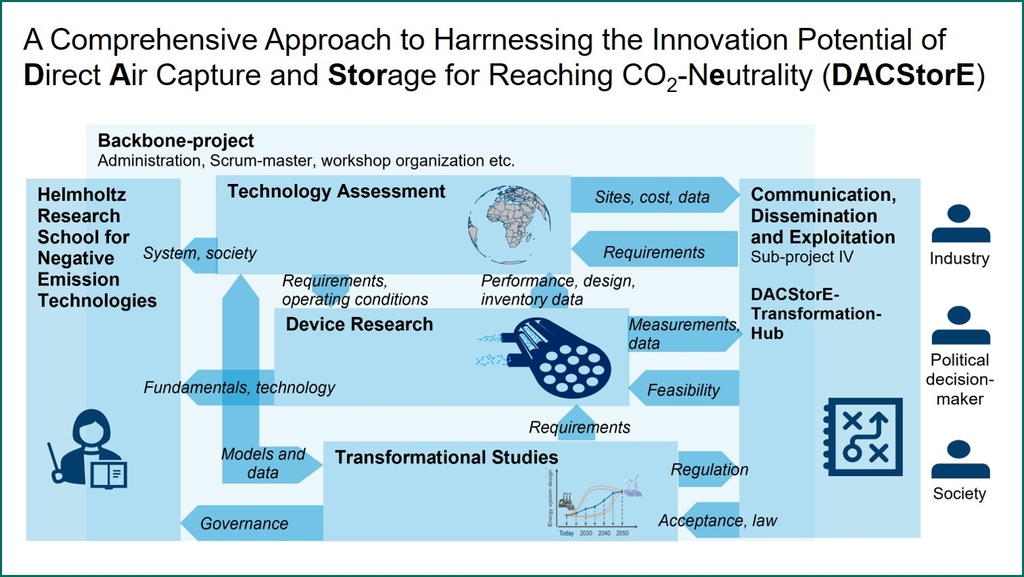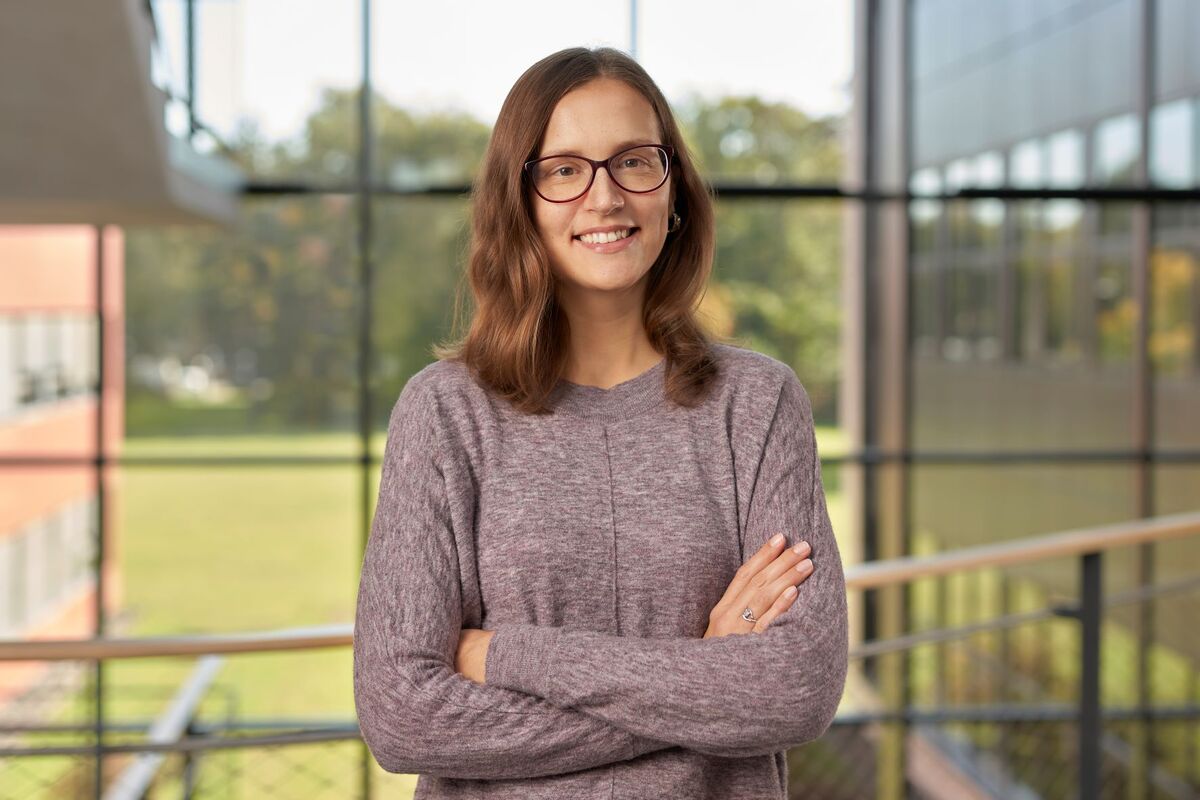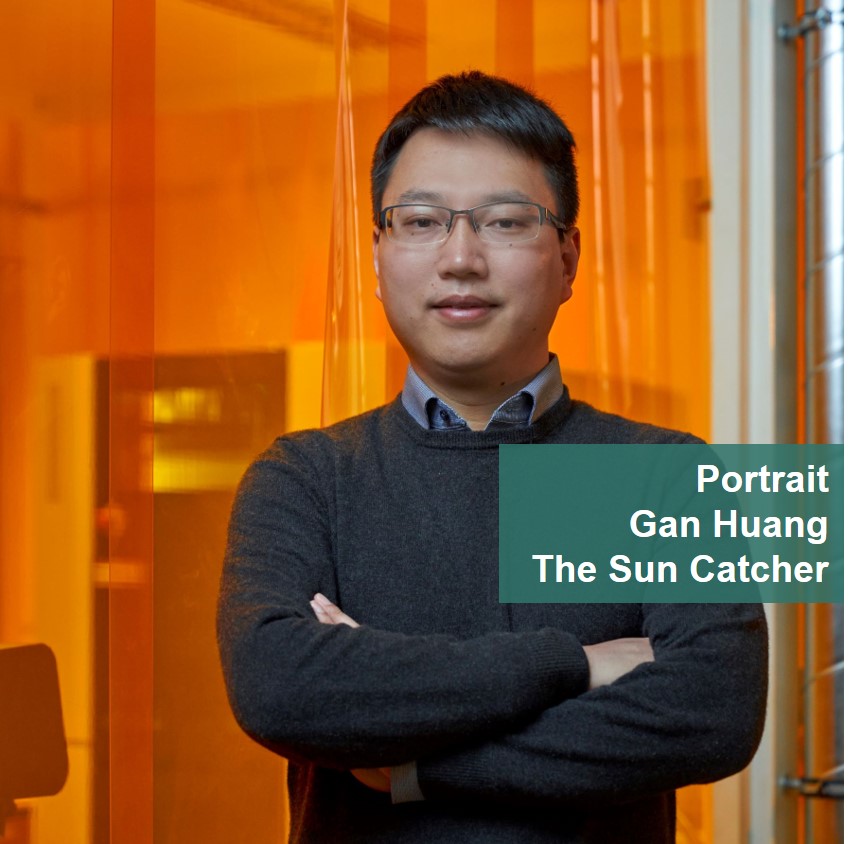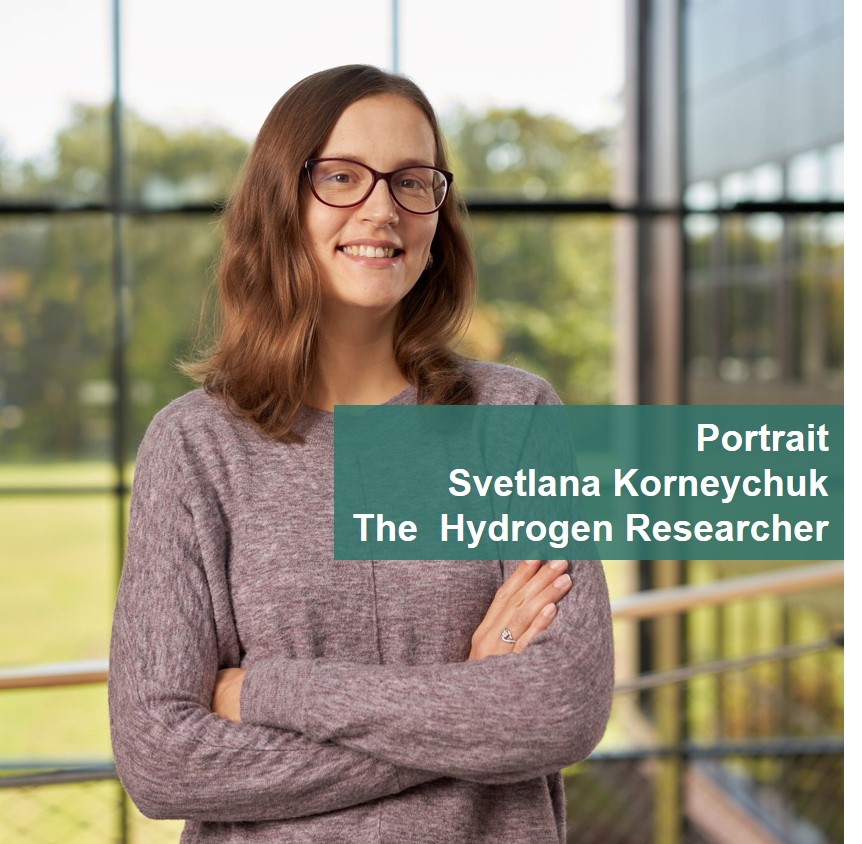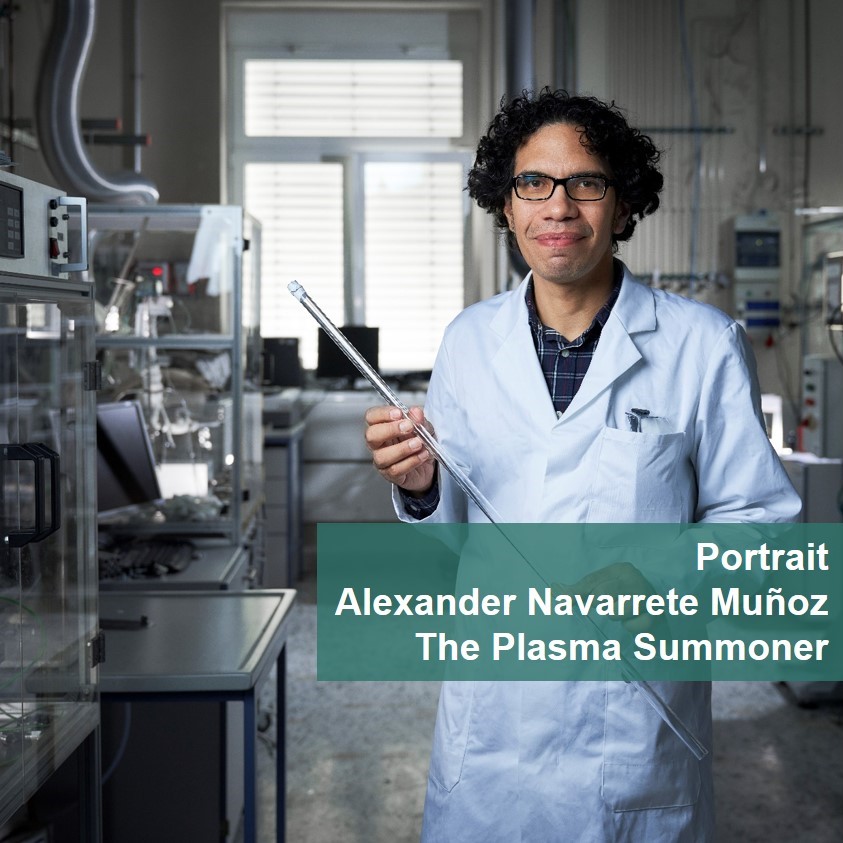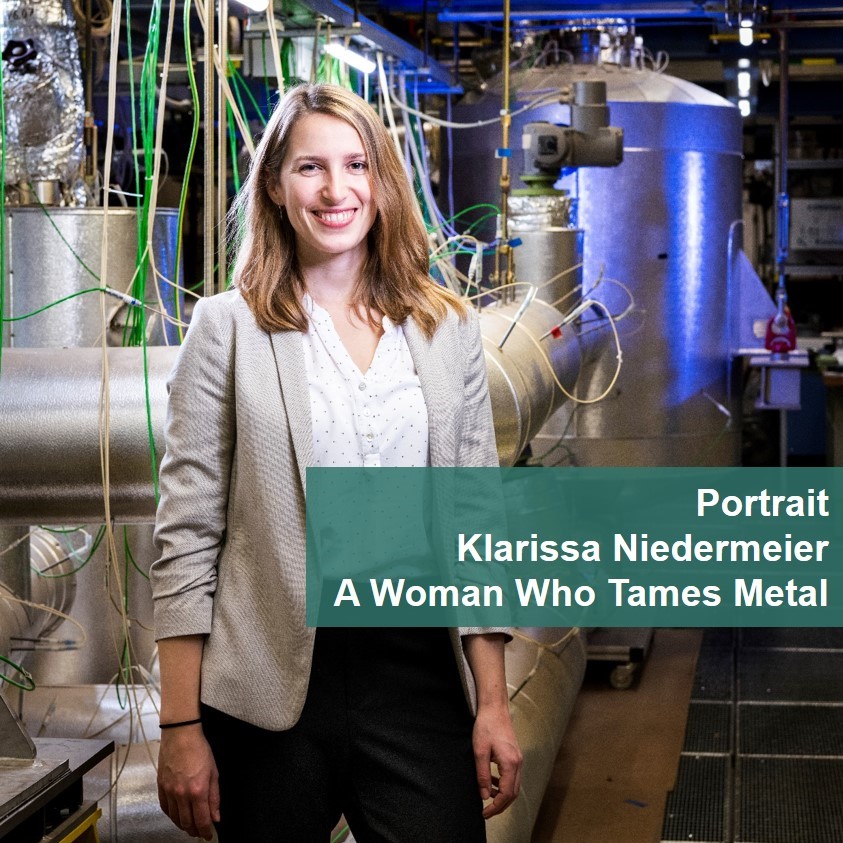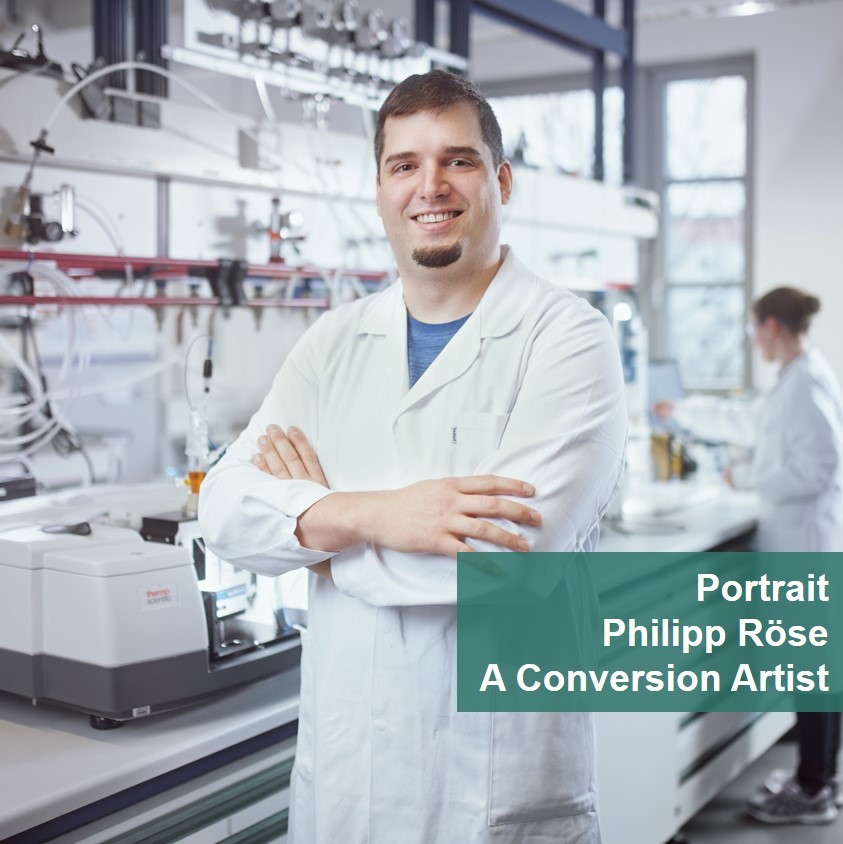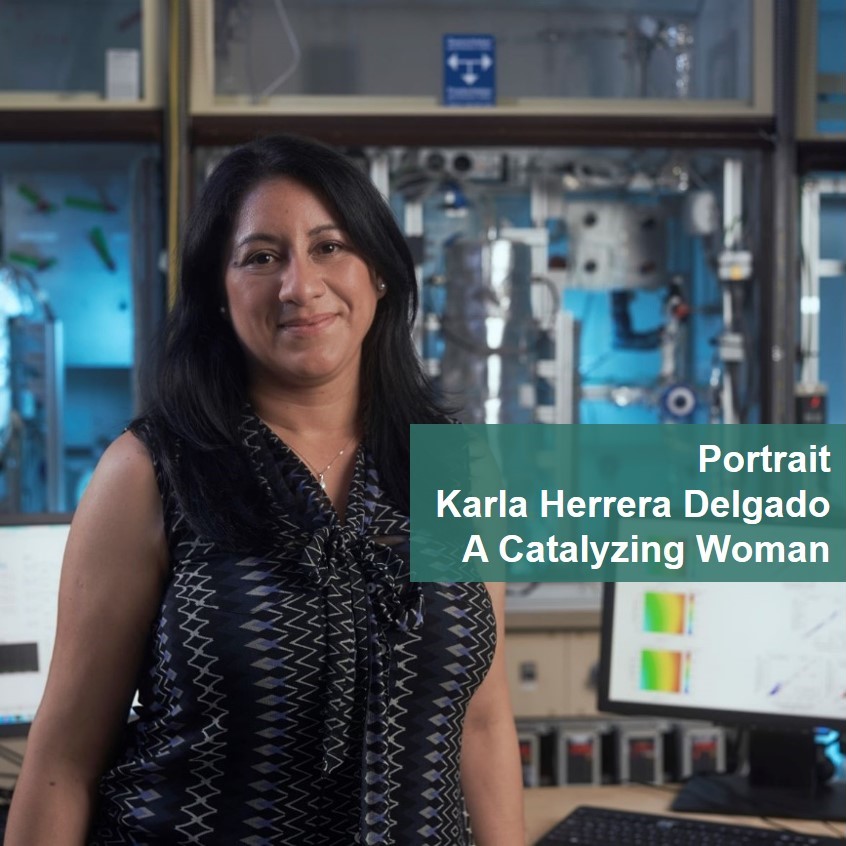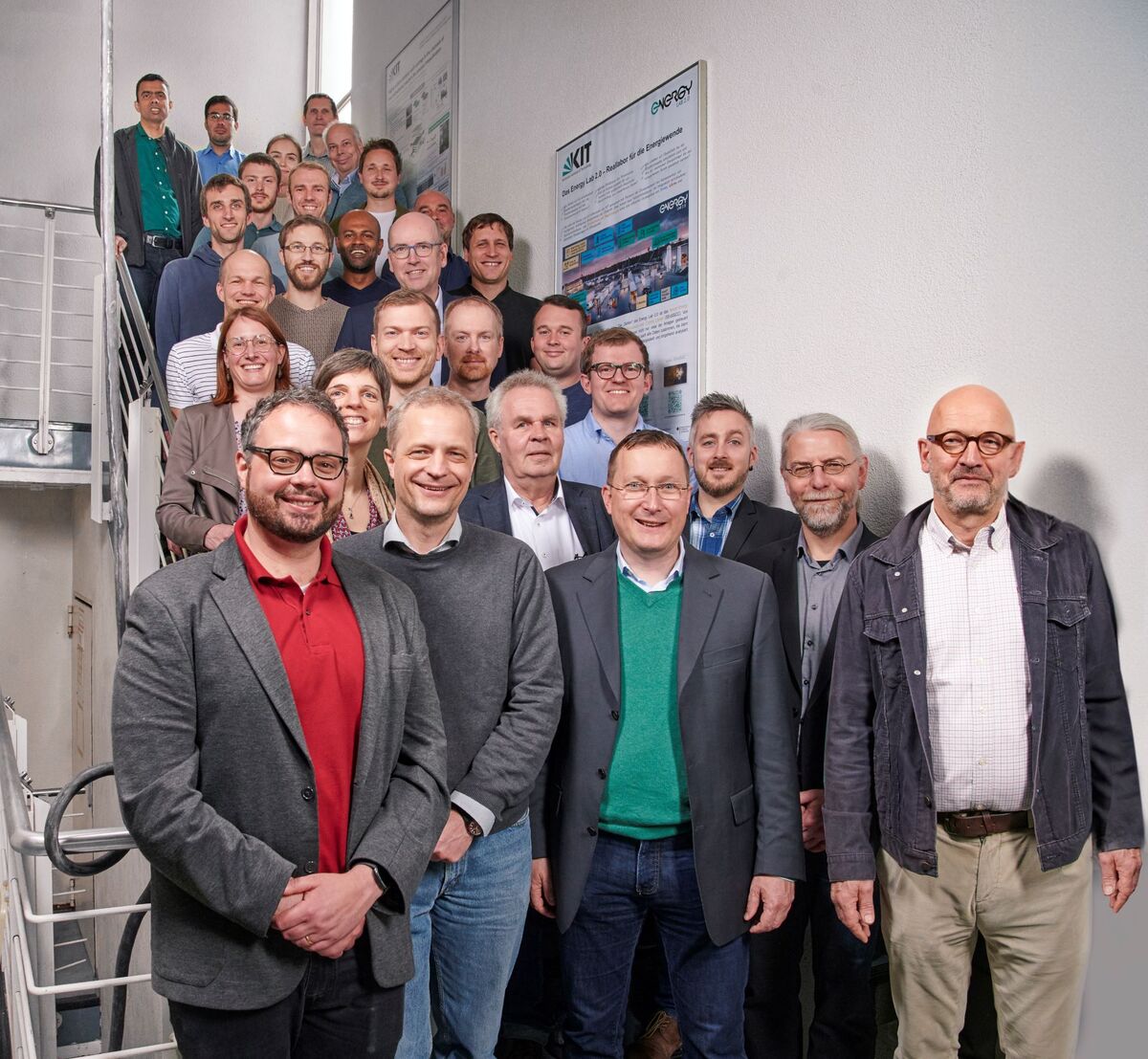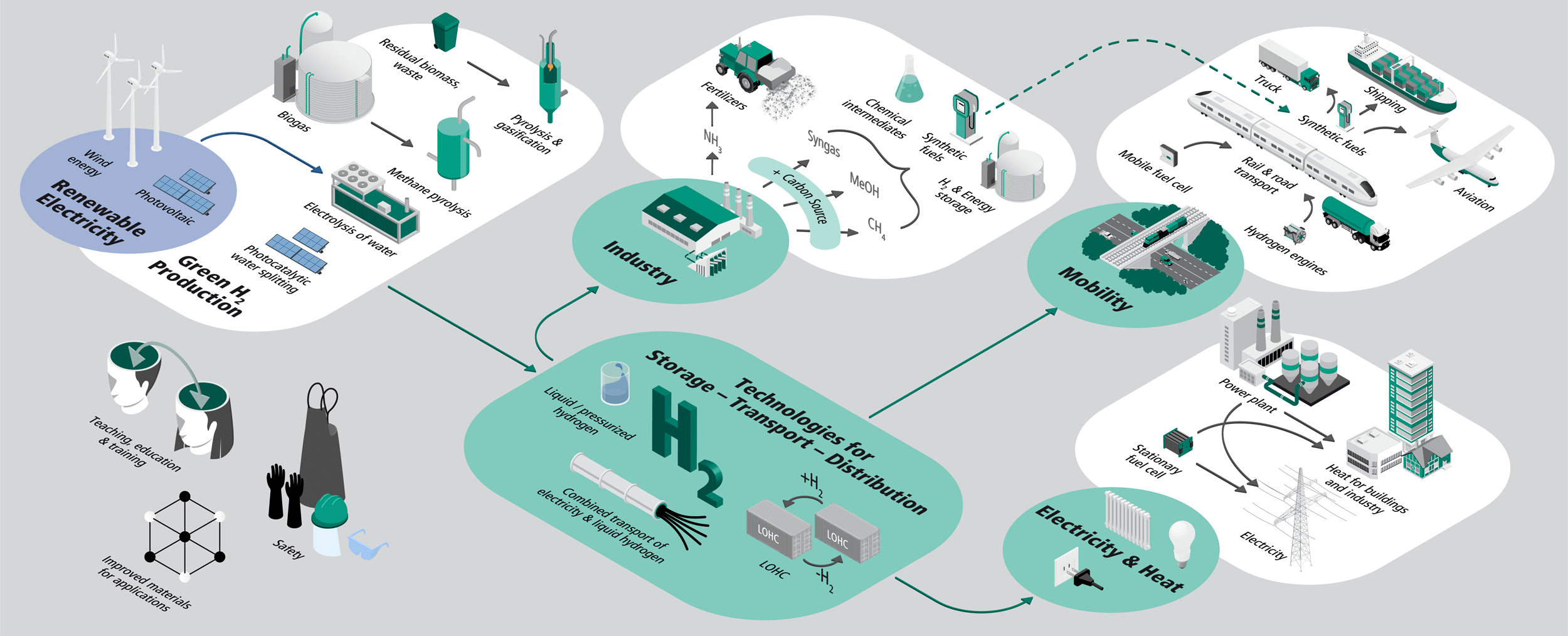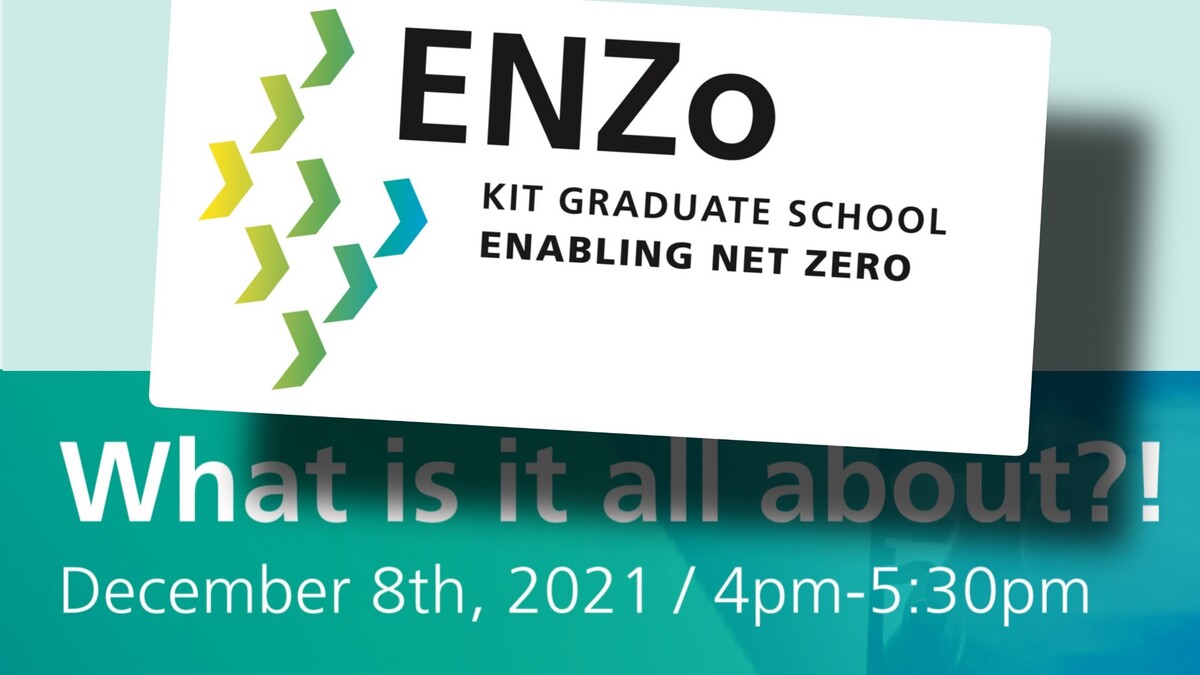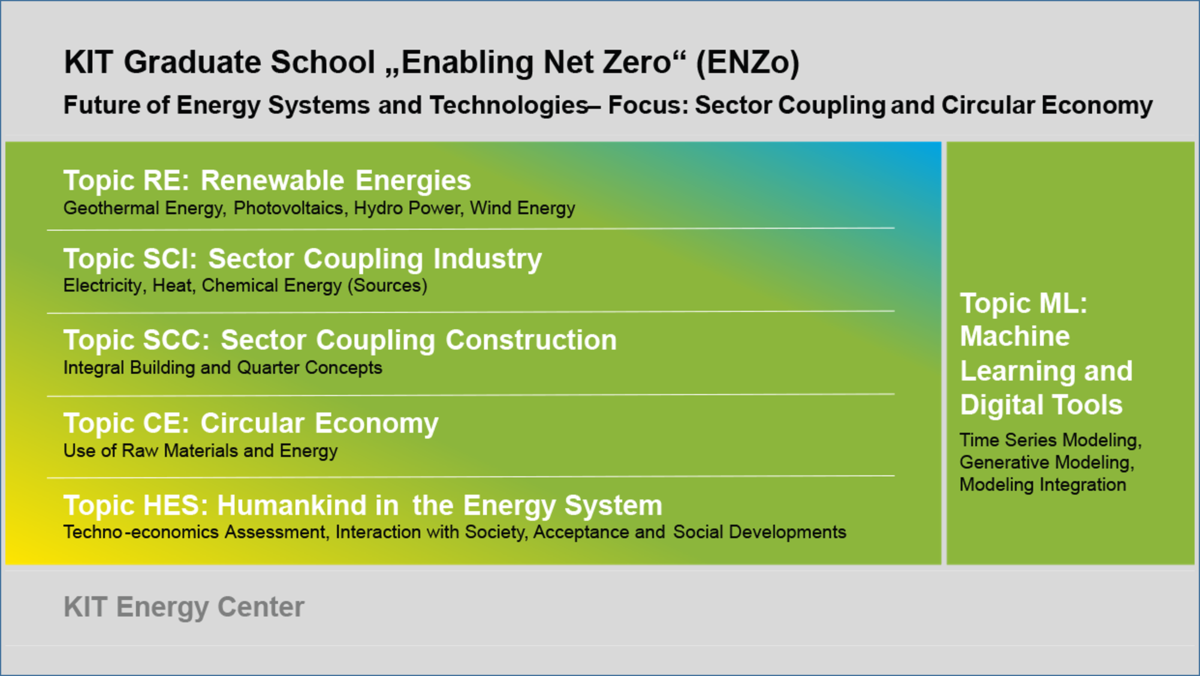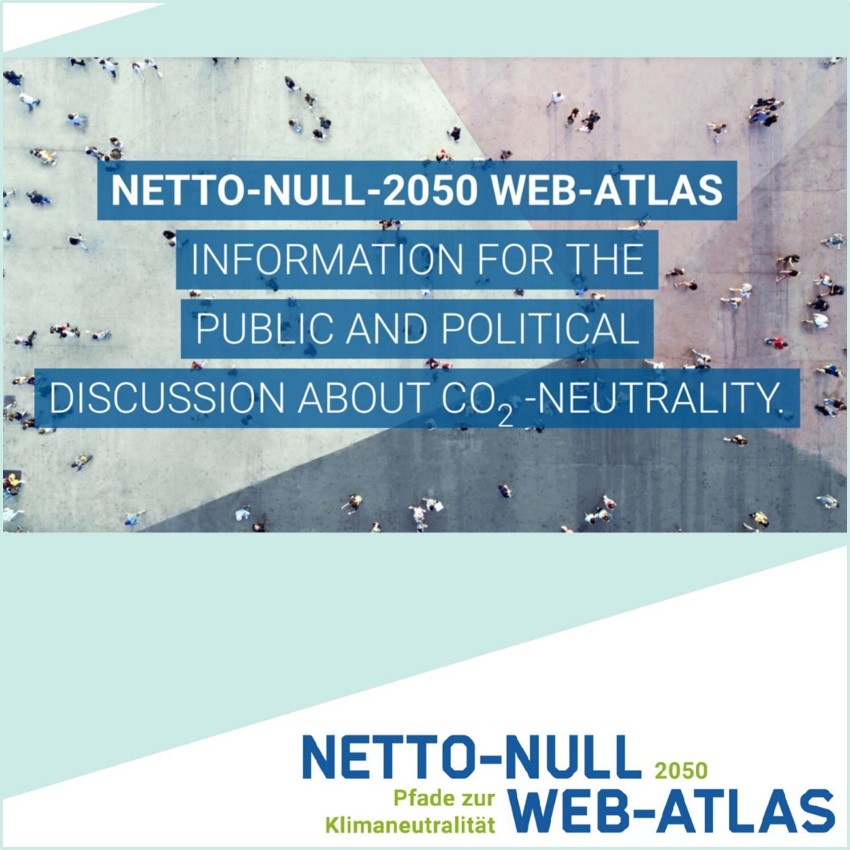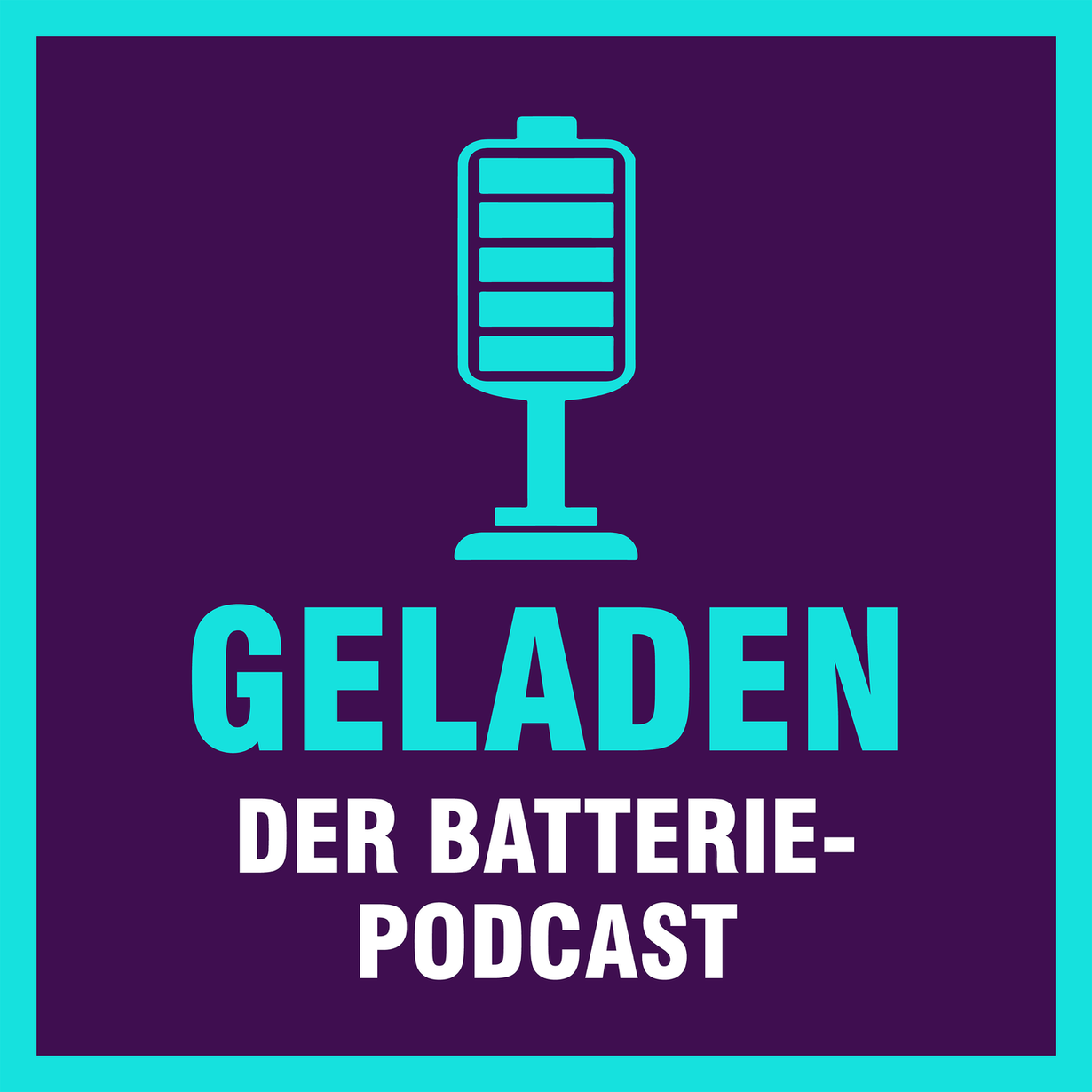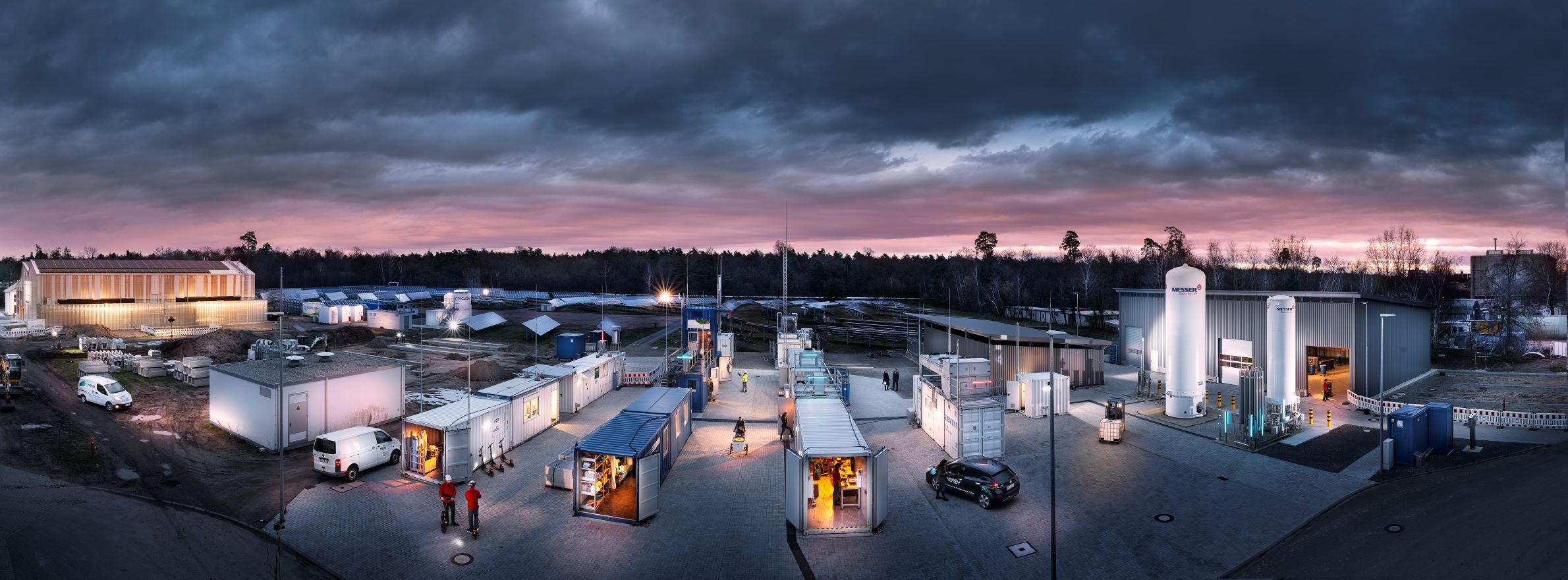We research materials and technologies for the energy transition at KIT in the Helmholtz Association.
Our goal is to provide sustainable technologies for a society in which energy supply and material cycles are linked in a defossilized circular economy. This requires efficient solutions for the conversion, transport, storage and use of energy and energy sources.
News | News Archive
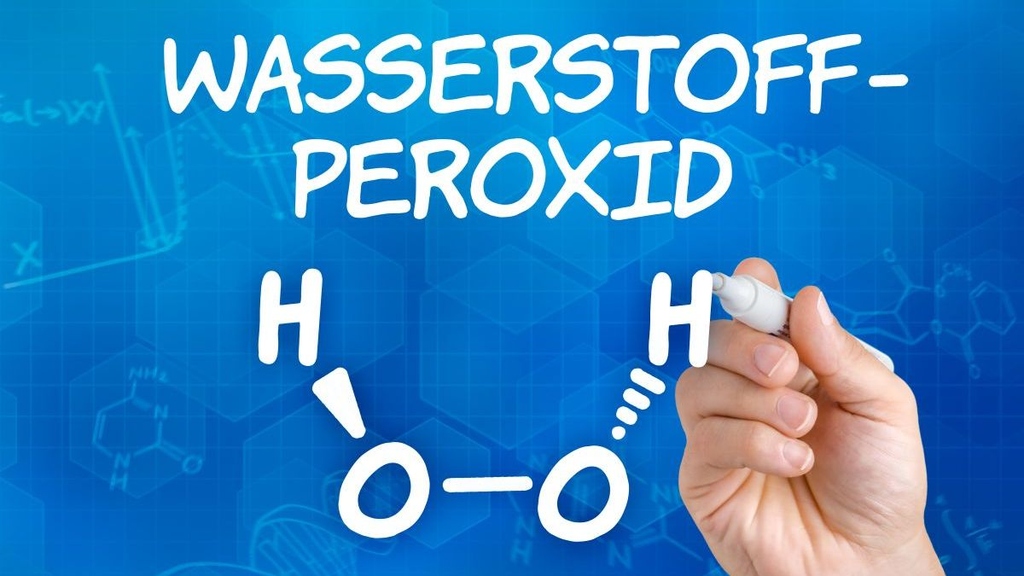
The German Research Foundation (DFG) grants 3.9 million euros to KIT research group that is investigating sustainable production methods for hydrogen peroxide.
KIT news in English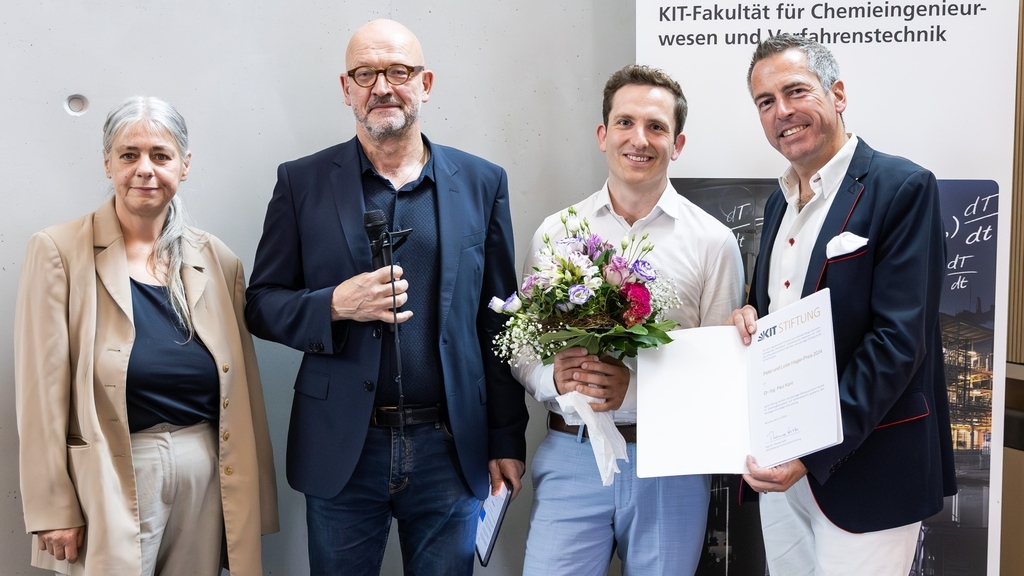
is awarded to Dr.-Ing. Paul Kant for his groundbreaking work on the rational design of optimized, cost-effective photocatalytic reactors with high quantum yield.
More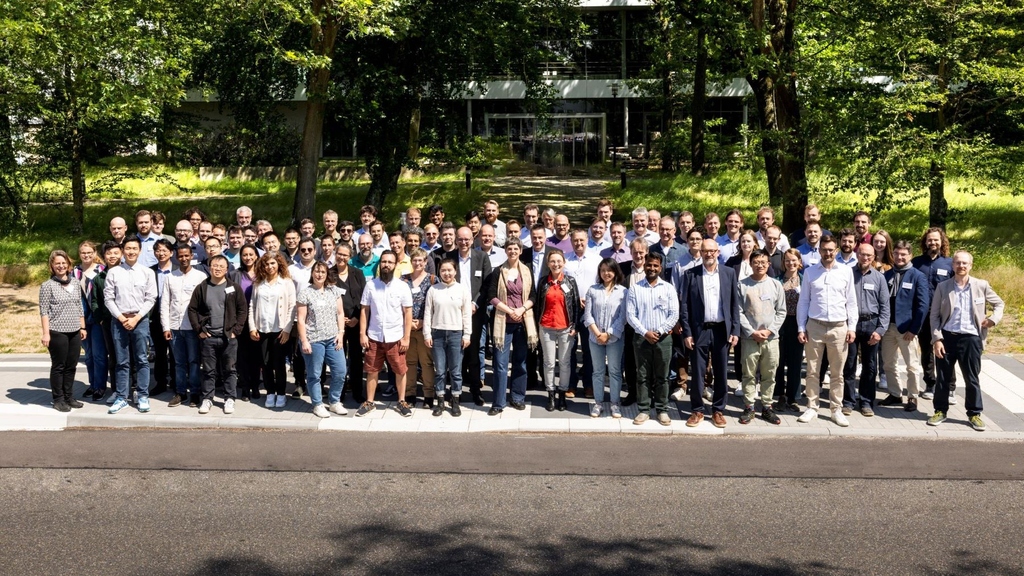
115 students, doctoral candidates and scientists met at KIT on June 12 and 13, 2024 to discuss progress and scientific challenges of our Helmholtz research program.
More...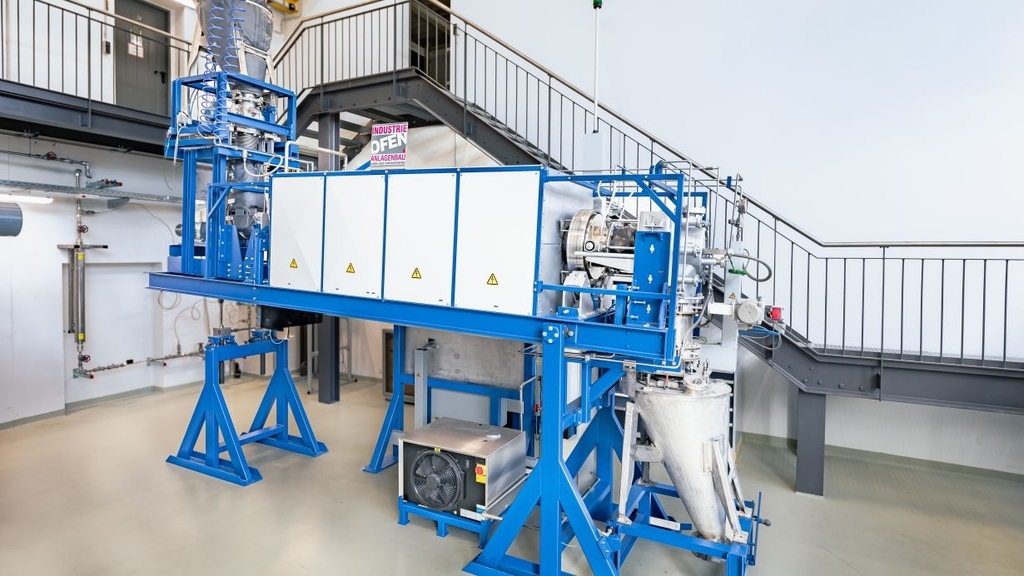
KIT reaches milestone in the development of a greenhouse gas-free circular concrete
KIT news in German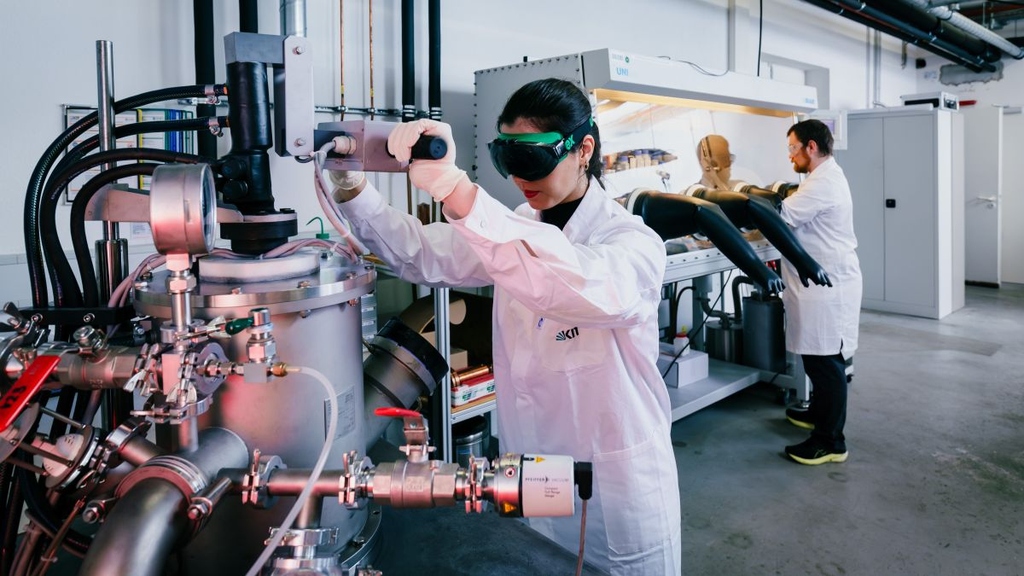
funding period: The German Research Foundation (DFG) extends joint Research Training Group on high-temperature composites of the partners KIT, TU Darmstadt and DECHEMA.
KIT news in English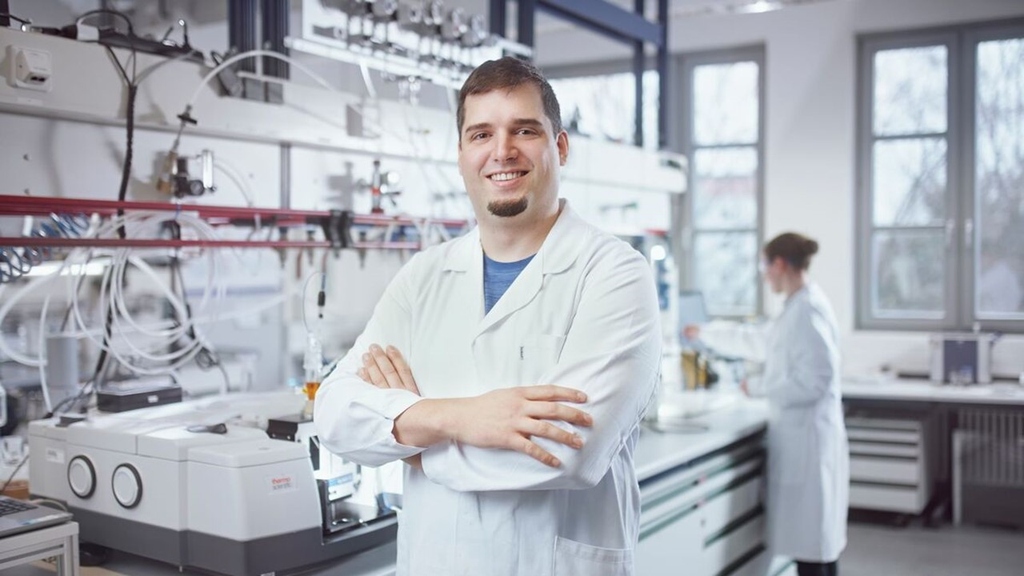
for his fundamental and original research work on the micro- and macrochemical analysis of electrochemical syntheses. Read more: Picture a Scientist - Portrait Philipp Röse.
linkedin.com/posts/dechema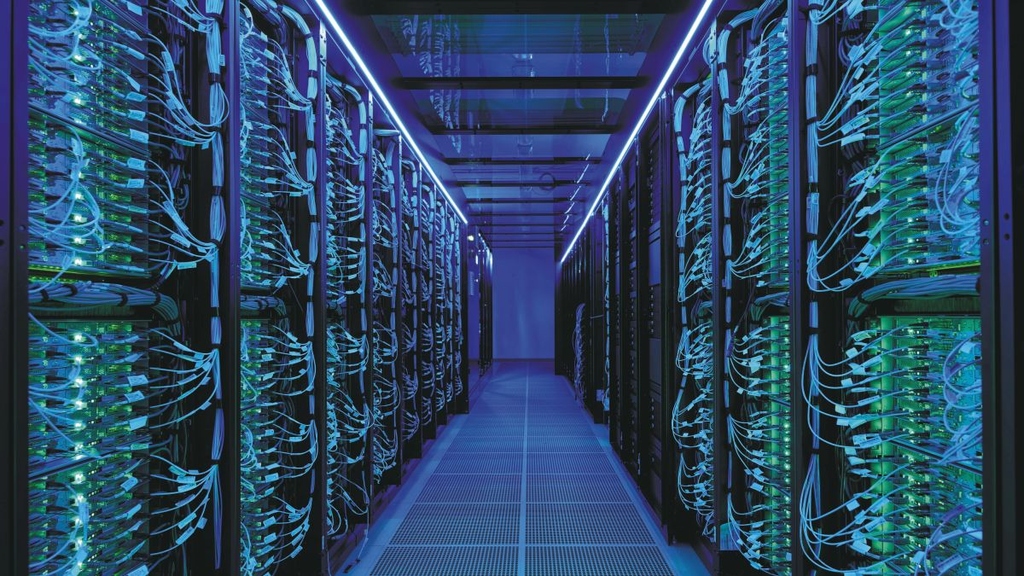
Helmholtz funds 4 new projects in the fields of medicine, environment & energy. KIT participates in SOL-AI: Development and optimization of photovoltaic materials.
KIT news in German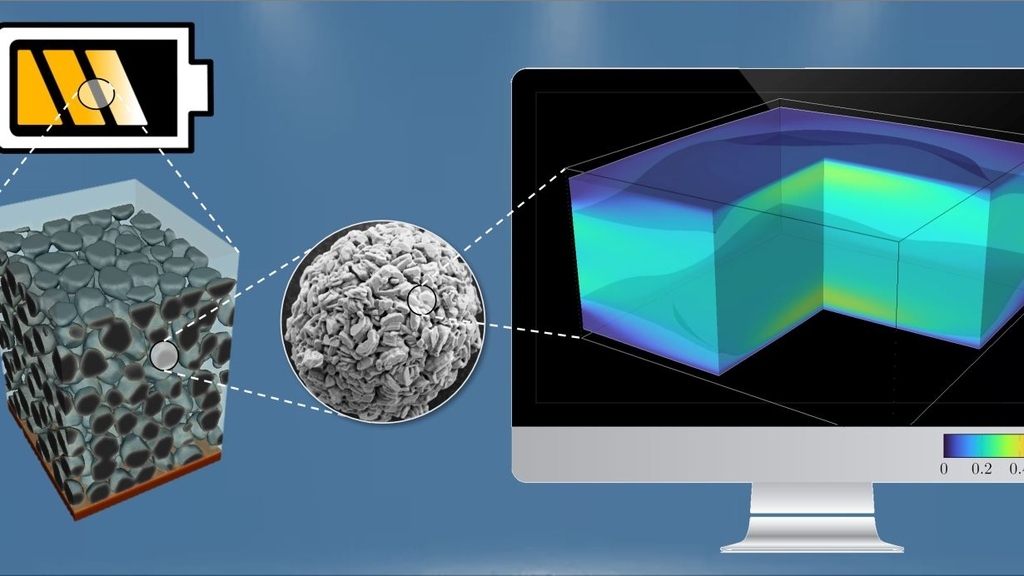
Exciting new findings from microstructure simulations show that elastic deformations play a significant role in the charging behavior of layered oxides as cathodes in sodium-ion batteries. Read Open Access!
KIT news in GermanHow will power-based fuels and chemicals replace the current fossil feedstocks in the future?
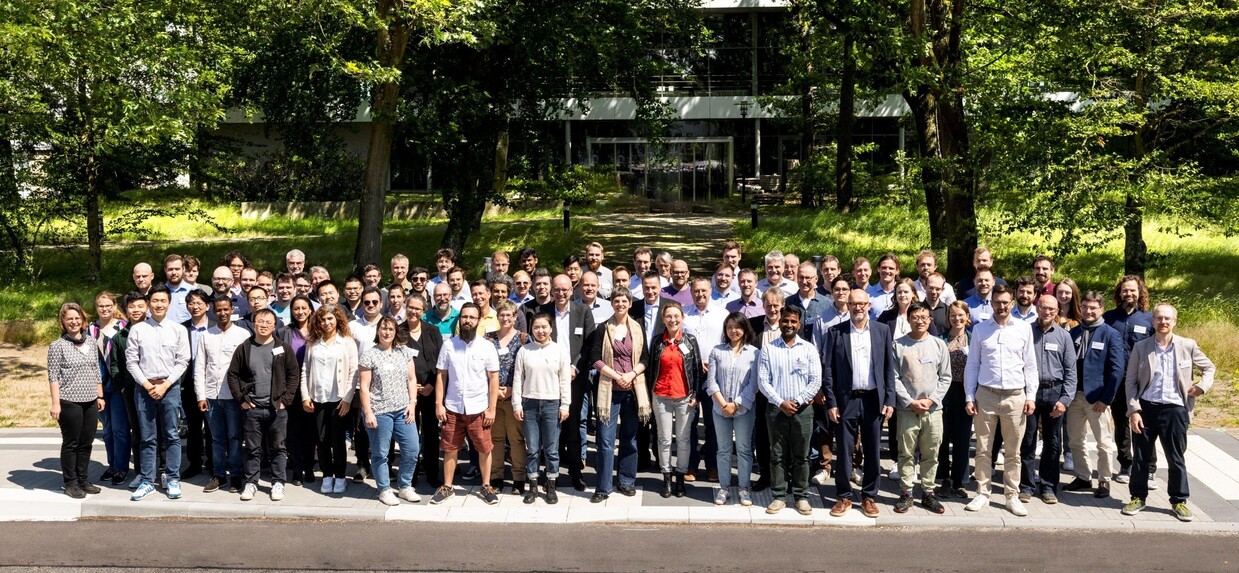
In order to achieve the climate goals, sector coupling and electrification based on renewable energies in the energy sector and industry must be optimized in a joint, holistic approach. Today, 70 to 80 percent of chemical feedstocks are derived from fossil sources. In the future, fuels and chemicals must come from renewable electricity for green hydrogen and renewable or recycled carbon sources such as CO2, biomass or waste.
To provide the technologies, materials and processes to meet these challenges, the approximately 200 scientists in the "Power-based Fuels and Chemicals" subtopic are working together in six topic areas:
- MIEC membrane reactors
- Conversion of CO/CO2-rich syngas
- Technologies for LOHC - Liquid organic hydrogen carriers
- Direct electrochemical synthesis (Electocatalysis beyond hydrogen)
- Modular integrated plants
- Plasma reactors / Plasma activation of inert molecules
Prof. Ulrike Krewer (KIT, Helmholtz Subtopic Spokesperson), Prof. Jörg Sauer (KIT Program Spokesperson) and Prof. Roland Dittmeyer (KIT Topic Spokesperson) welcomed the 115 participants. The presentations and the poster session with about 50 posters provided an opportunity for discussion and exchange of new ideas. The program also included a tour of the research facilities at KIT Campus North and South on a sunny June day.
Participants were invited to visit three of the six possible stations on the lab tour.
- Power to X Lab @ Energy Lab
- Catalyst Design Center (CDC) @ IKFT
- Liquid Metal Based Thermochemistry and Heat Storage @ ITES
- Plasma Laboratory @ IHM
- 3D Printing Lab & Electro Catalysis of CO2 @IMVT
- Electrochemistry Lab @ IAM-ET, Campus South (bus transfer)
Our website offers information about the scientists who have presented their laboratories and their research topics.
- Dr. Herrera Delgado works at the Catalyst Design Center (CDC),
- Dr. Navarrete Muñoz investigates the activation of carbon dioxide with microwave plasma,
- Dr. Philipp Röse is working on direct electrochemical synthesis,
- Dr. Klarissa Niedermeier investigates Liquid Metal Based Thermochemistry and Heat Storage.
Hannover Messe 2024 - Discover our contributions to sustinable materials and technologies for the energy transition
Highlights from the Technological Development
Come and visit us at the Future Hub > Hall2, Booth B35
Net-Zero Circular Concrete – Concrete without Emissions Harmful to the Climate
An innovative circular approach is pursued to produce concrete with a low consumption of resources and without emissions affecting the climate. Concrete waste resulting from the demolition of buildings is crushed and sorted into coarse and fine fractions. Limestone is added to the fine fraction to produce a binder at moderate process temperatures. The coarse fraction absorbs the carbon dioxide (CO2) produced in the course of the process. Together with the binder, it is used for producing new concrete. The pilot plant that is being set up at KIT will be used to gain the know-how for the production of larger quantities.
By loading you accept YouTube's privacy policy.
Come and visit us at the Energy Solutions > Hall13, Booth C76
Heat Transfer with Liquid Metals
Thermal energy storage systems can store energy in the form of heat as needed by industrial high-temperature processes in chemical or metal processing industries. Liquid metals enable heat storage at very high temperatures. They are combined with ceramic beads having a high storage density and long-term storage capacity. A pilot plant will demonstrate operation of a liquid metal-based heat storage system.
BiFlow – Hybrid Storage System for Power and Heat Supply
The energy transition and extended use of renewable energy sources require large storage capacities. The BiFlow project focuses on the development of a hybrid storage system that combines specific advantages of the lithium-ion battery with those of the redox-flow battery. The electrolyte tanks of the redox-flow battery are additionally used to store heat. In connection with a thermal coupling module, it increases the storage capacity and total efficiency of the system. This opens up new options for cost- and space-efficient co-storage.
Litona – Materials for Sustainable Sodium-ion Batteries
KIT’s startup Litona develops energy storage materials for sodium-ion batteries. Sodium-based batteries can be produced using abundant and inexpensive materials. This will reduce future costs of batteries and the dependence of Europe on imports of resources. Litona’s work presently concentrates on Prussian white analogs. These storage materials are of interest for stationary energy storage applications and for the e-mobility sector.
By loading you accept YouTube's privacy policy.
Safe Hydrogen Storage Systems
Hydrogen (H2) is a clean, efficient, and reliable energy carrier for many applications. KIT has more than 30 years of experience in H2 safety research. Its hydrogen test center HYKA accommodates worldwide unique infrastructures for experiments covering various release and combustion scenarios. The PET (partially vented explosion tube) is used to study turbulent combustion processes in hydrogen-air mixtures found in partially vented geometries. These may be leaky H2 storage tanks in rooms with doors and windows. Researchers also develop 3D simulation programs to specifically analyze and improve safety conditions.
KIT at Other Stands
The Center for Electrochemical Energy Storage Ulm & Karlsruhe (CELEST) will also be present at the stand of Baden-Württemberg international (hall 12, stand D15). KIT, Ulm University, and the Center for Solar Energy and Hydrogen Research Baden-Württemberg (ZSW) cooperate in CELEST, the biggest platform for electrochemical storage systems in Germany.
At the stand of the Federal Ministry of Education and Research (hall 2, stand A28), the AppLHy! exhibit highlights the design and implementation of a combined transport route for liquid hydrogen and electric power. Power will be transmitted with the help of high-temperature superconductors. Read more.
KIT’s Contributions to the Conference Program
Tech Transfer Conference Stage (Hall 2, Stand B02)
Tuesday, April 23 2024, 14.50 hrs
Presentation in English with live interpretation: Net-zero Circular Concrete
Dr. Peter Stemmermann, Institute for Technical Chemistry of KIT.
ENERGY 4.0 Academy (Hall 12, Stand D35/26)
Thursday, April 25, 2024, 10.00 hrs
Presentation in German: Methane pyrolysis as a key element for emission-free hydrogen and carbon production
Prof. Dr.-Ing. Thomas Wetzel, Institute of Thermal Process Engineering of KIT
lookKIT 2024/1: Ressources. Circular Economy. Energy.
source: PDF
Global resource consumption is increasing rapidly. According to calculations, we would have needed significantly more than one earth to meet demand two years ago. This emphasizes that we need to use materials and energy more carefully and efficiently. Therefore circular economy and intelligent storage technologies are important keywords At the Hannover Messe, KIT researchers present solutions to this problem.
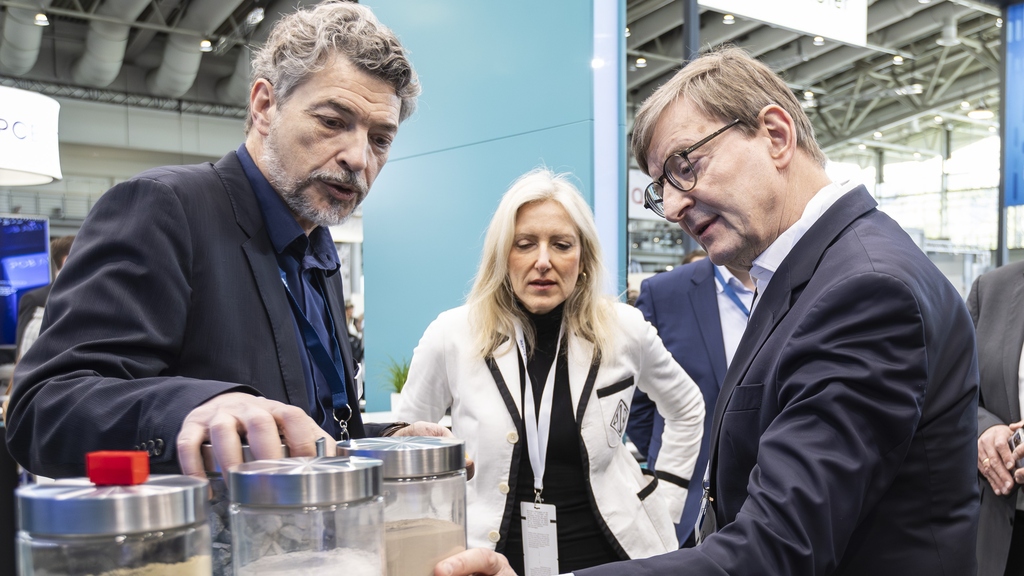
Dr. Peter Stemmermann, left, Institute for Technical Chemistry, KIT in discussion with Helmholtz President Prof. Dr. Otmar D. Wiestler and Franziska Broer, Managing Director of the Helmholtz Association about Net-Zero Circular Concrete - concrete without climate-damaging emissions.
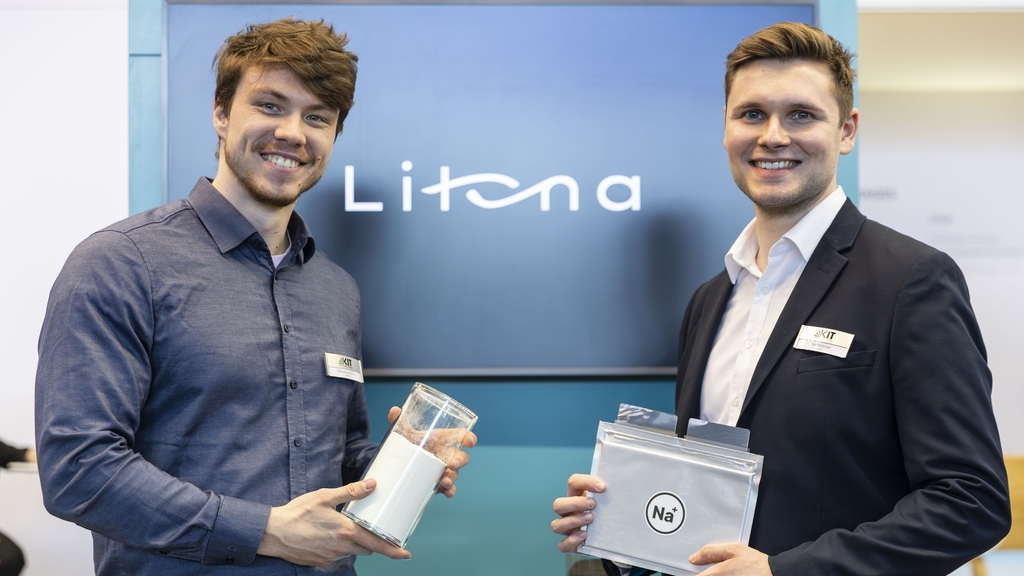
Sebastian Büchele (left, Litona founder) and Tom Bötticher show a bottle of Prussian white, an energy storage material for sodium-ion batteries. They can be produced using abundant and inexpensive materials reducing the dependence of Europe on imports of resources.
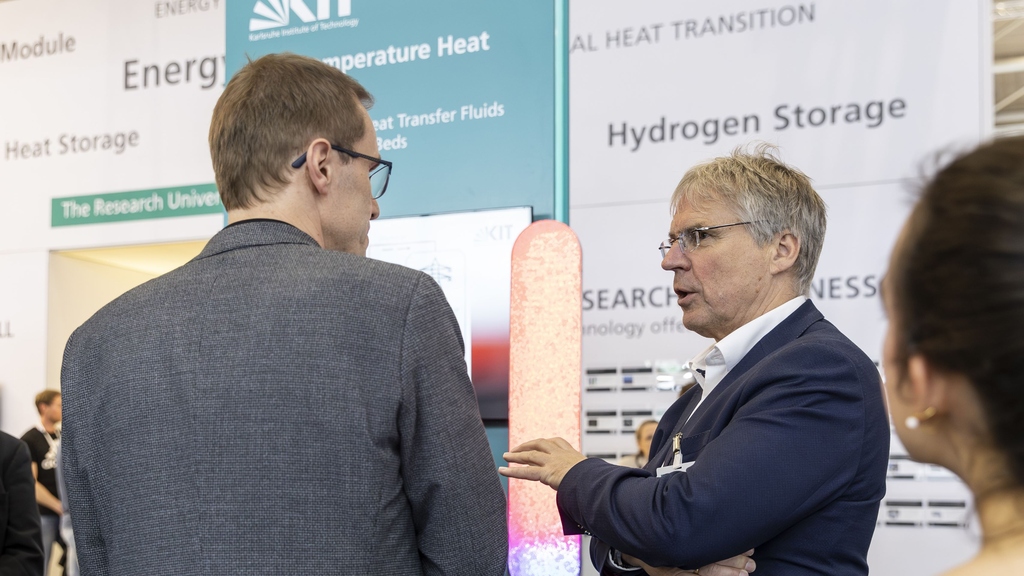
Prof. Holger Hanselka, Fraunhofer President and Prof. Thomas Wetzel, KArlsruhe Liquid metal LAboratory (KALLA), KIT, discuss the first pilot plant demonstrating operation of a liquid metal-based heat storage system.
EU project RISEnergy | Accelerating Innovations for Climate Neutrality
One of the EU’s goals is to achieve climate neutrality by 2050. On our way there, the RISEnergy (stands for: Research Infrastructure Services for Renewable Energy) project aims to accelerate the development of innovations for the use of renewable energy sources and the commercialization of the respective technologies. Above all, access of researchers and companies to research infrastructures in European and non-European countries will be facilitated. The project coordinated by Karlsruhe Institute of Technology (KIT) will start on March 1, 2024. RISEnergy will be funded by the European Commission with about EUR 14.5 million for a duration of four and a half years.
RISEnergy will create a European ecosystem covering all areas of renewable energy technologies. We want to push the development of promising technologies from the laboratory level to industrial maturity. Joint research infrastructure projects have already been launched for certain technologies, but RISEnergy is the first project of this dimension in Europe that covers all areas of renewable energy technologies: Photovoltaics, Concentrated Solar Power, Hydrogen, Biofuels, Wind Energy, OceanEnergy, as well as Integrated Grids, Energy Storage, Materials Research, Information and Communication Technologies.
Consortium of Institutions from 22 Countries
The RISEnergy consortium consists of 69 technology institutes, universities, and industry partners from 22 countries. The partners contribute with their infrastructures, know-how, or provide organizational support.
Researchers Can Apply
Within the framework of RISEnergy, 84 research infrastructures from 19 European countries, the USA, Canada, and Japan will open their facilities to external researchers and company developers, who can apply for access. An expert committee will decide. If approved, RISEnergy will cover the costs of the research facility as well as travel and accommodation expenses. Most of the project budget will be used for this purpose.
Picture a Scientist - Portrait Svetlana Korneychuk
The Hydrogen Researcher
"The energy of tomorrow is water, which has been broken down by electric current. The elements of water broken down in this way, hydrogen and oxygen, will secure the Earth’s energy supply far into the future”. For Jules Verne, this was a vision he wrote down in his 1875 novel "The Mysterious Island." Dr. Svetlana Korneychuk, however, likes to quote the French author because his vision is closer to reality today than ever before. With her work at Karlsruhe Institute of Technology (KIT), the researcher contributes to making hydrogen as an energy carrier affordable and suitable for everyday use.
Workshop "Grid Integration of Electrolysis" with KIT Technology and Grid Experts
Scientists of the Helmholtz programs ESD and MTET discussed scientific and technical issues of the grid integration of electrolysis and subsequent steps on May 12, 2023, at KIT Campus North. After a first scientific and technical exchange on the important key topics, working groups were formed to deal with the following issues in the future:
-
What kind of transient data do we need/could we use? (experimental side)
-
Co-simulation in open software sense (modeling)
-
How to connect renewable energy sources to electrolysers in the most efficient way? The role of power electronics in connecting electrolysers to the grid.
-
How to design electrolyzer systems? Operation of electrolyzer itself (SOH, interfaces,…)
-
Dynamics of the downstream processes; role of storage as buffer
High-Temperature Superconductivity - "In principle, there is no better way to transport or use electricity"
Research networks promote knowledge transfer!
By loading you accept YouTube's privacy policy.
Prof. Tabea Arndt is curator of the Research Field High-Temperature Superconductivity of the Research Network "Industry and Commerce" which is a part of the Research Networks Energy of the BMWK.
More information about the research networks energy:
- Website Research Networks Energy (in German)
- Research Network Industry and Trade and Research Field HTSL (in German)
- more information on the research topic High-Temperature Superconductivity (in German)
- more information on the research policy and research funding of the BMWK (in German)
Zeitenwende Energy Security
3+1 initiatives to rapidly improve the security of supply of energy and energy materials. The fourth initiative is RESUR a Helmholtz platform for the design of robust energy systems and raw material supply.
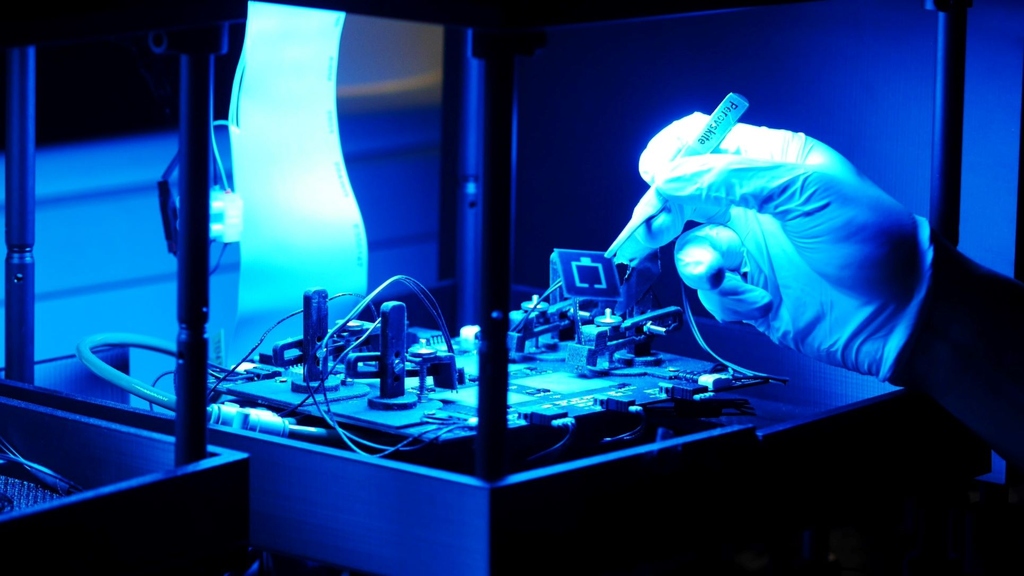
Learn more!
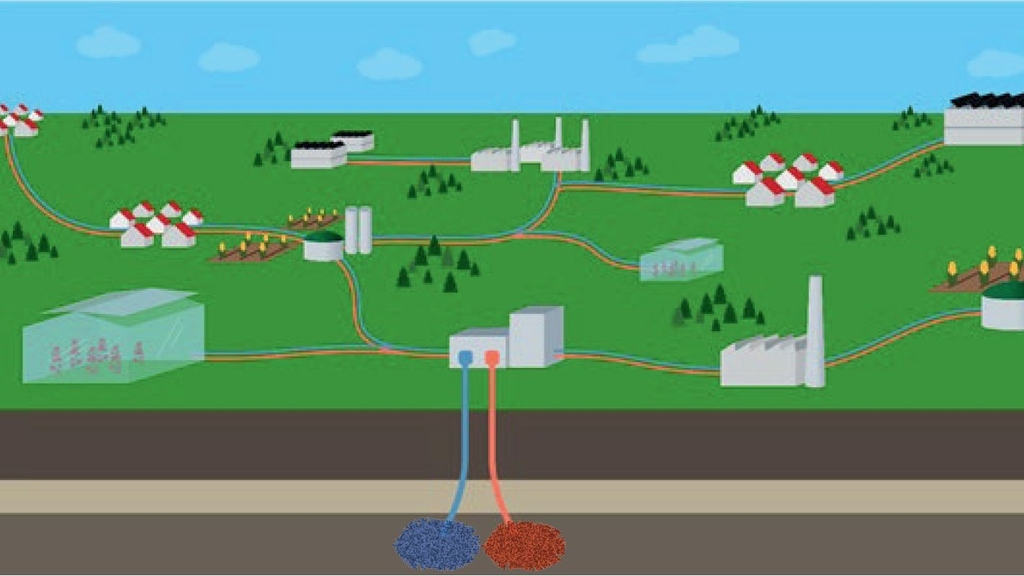
Learn more!

Learn more!
3D printing laboratory & Fischer Tropsch synthesis plant
Application and Research Fields Hydrogen
Hydrogen can be produced by renewable energy through electrolysis of water, methane pyrolysis of biogas or pyrolysis and gasification of residual biomass and waste. This green hydrogen can be used in the steel industry and for the production of basic chemicals and PtX products in the chemical industry. This allows a defossilization of the industrial sector, which until now has used fossil energy and fossil material sources. An application in the mobility sector is also possible where the direct use of electricity from renewable energies is impossible.
We are actively involved in the fields of production, storage, transport, distribution, application and cross-cutting issues. >>> More information
New KIT Graduate School ENZo
The new graduate school ENZo offers the next generation of young researchers the opportunity to apply interdisciplinary knowledge in application-oriented projects that can visibly contribute to the transformation of the energy system.
Future researchers are characterized not only by their desire to understand how developments and technologies can be embedded in the overall context of the energy system, but also by their desire to contribute to its sustainable design. MTET themes such as
- Renewable Energy,
- Sector Coupling Industry - Electricity, Heat, Chemical Energy (Sources), and
- Circular Economy - Use of Raw Materials and Energy
are holisticly combined in the "Real World Projects" with the important viewpoints and aspects such as
- Machine Learning and Digital Tools
- Technoeconomics Assessment, Interaction with Society, Acceptance and Social Developments.
Embedded in the manifold technological and scientific possibilities at the KIT Energy Center, ENZo creates a unique development environment for PhD students.
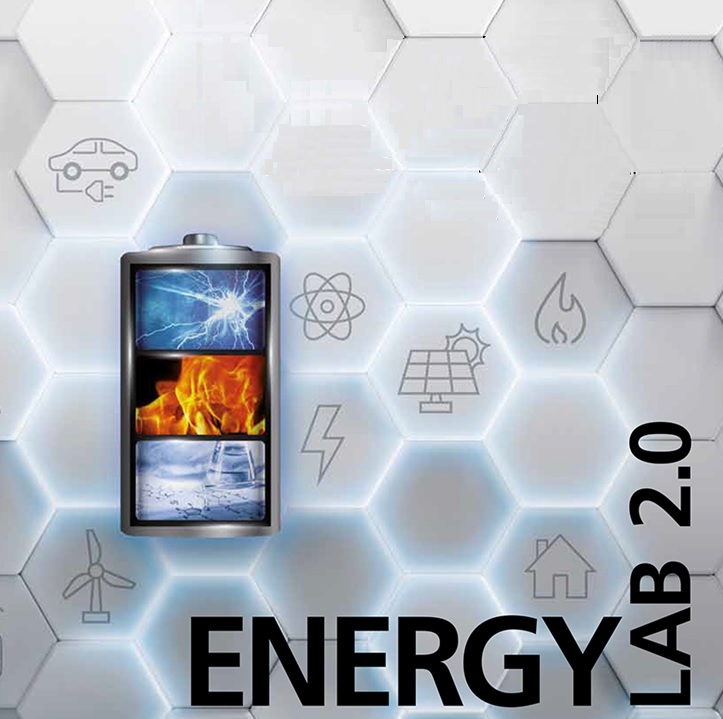
... combines electric, thermal & chemical energy flows as well as new information & communication technologies as the only infrastructure of this kind in Germany.
more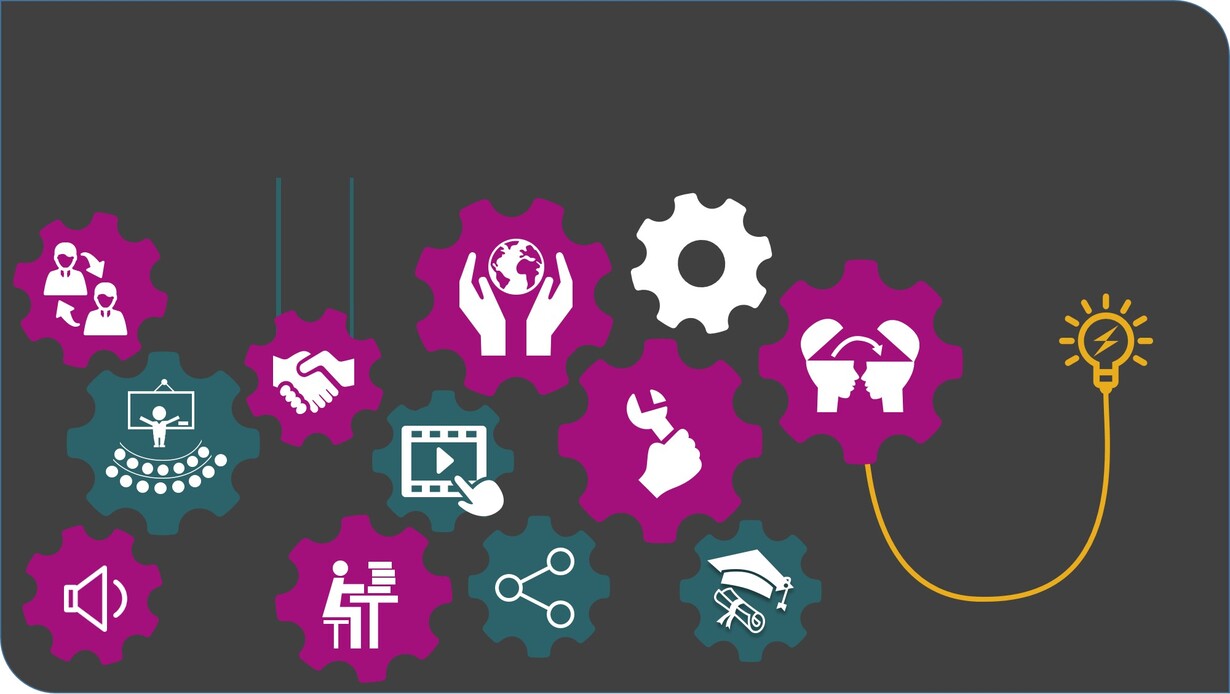
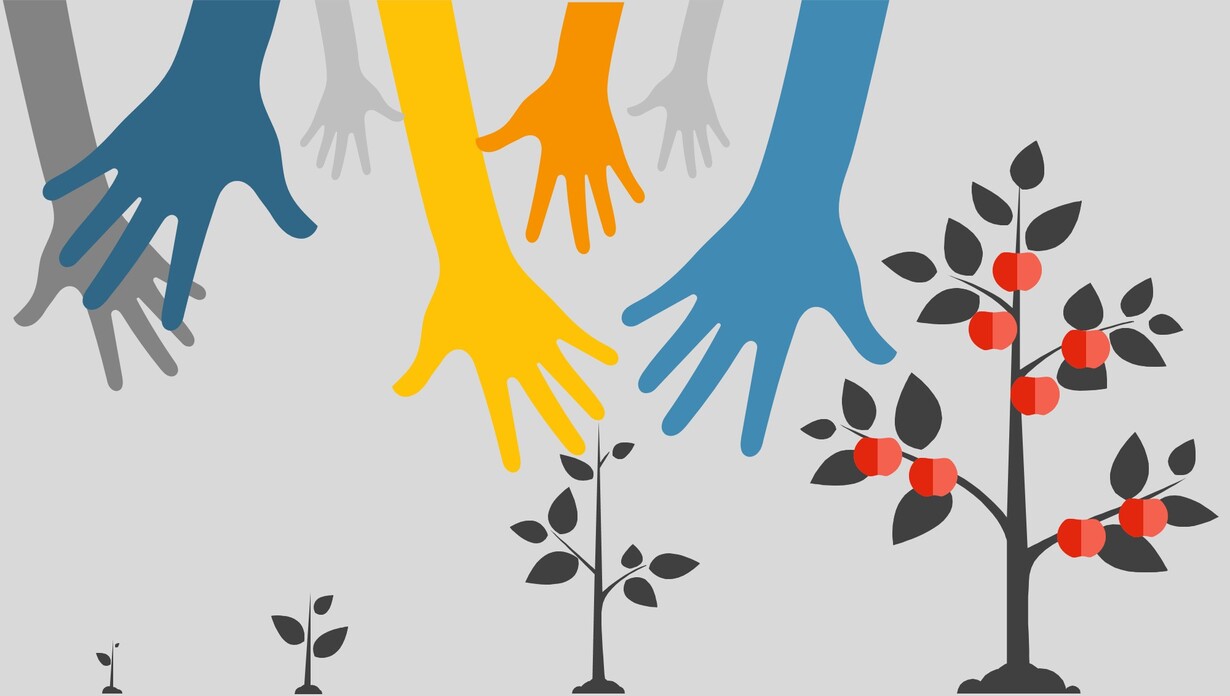
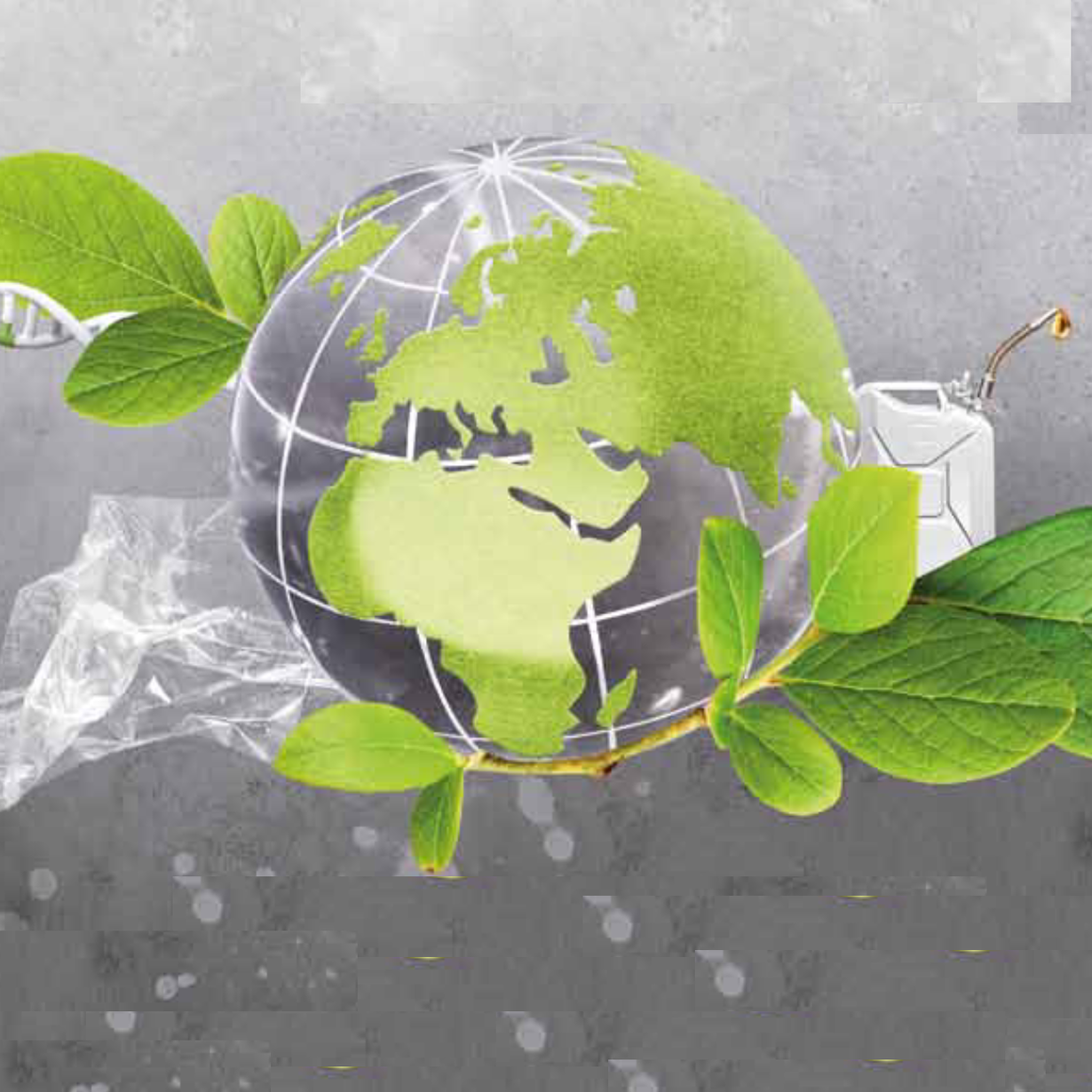
Subject of the Science Year 2020/21 plays an important role in the MTET Topics Chemical Energy Carriers and Ressource & Energy Efficiency.
more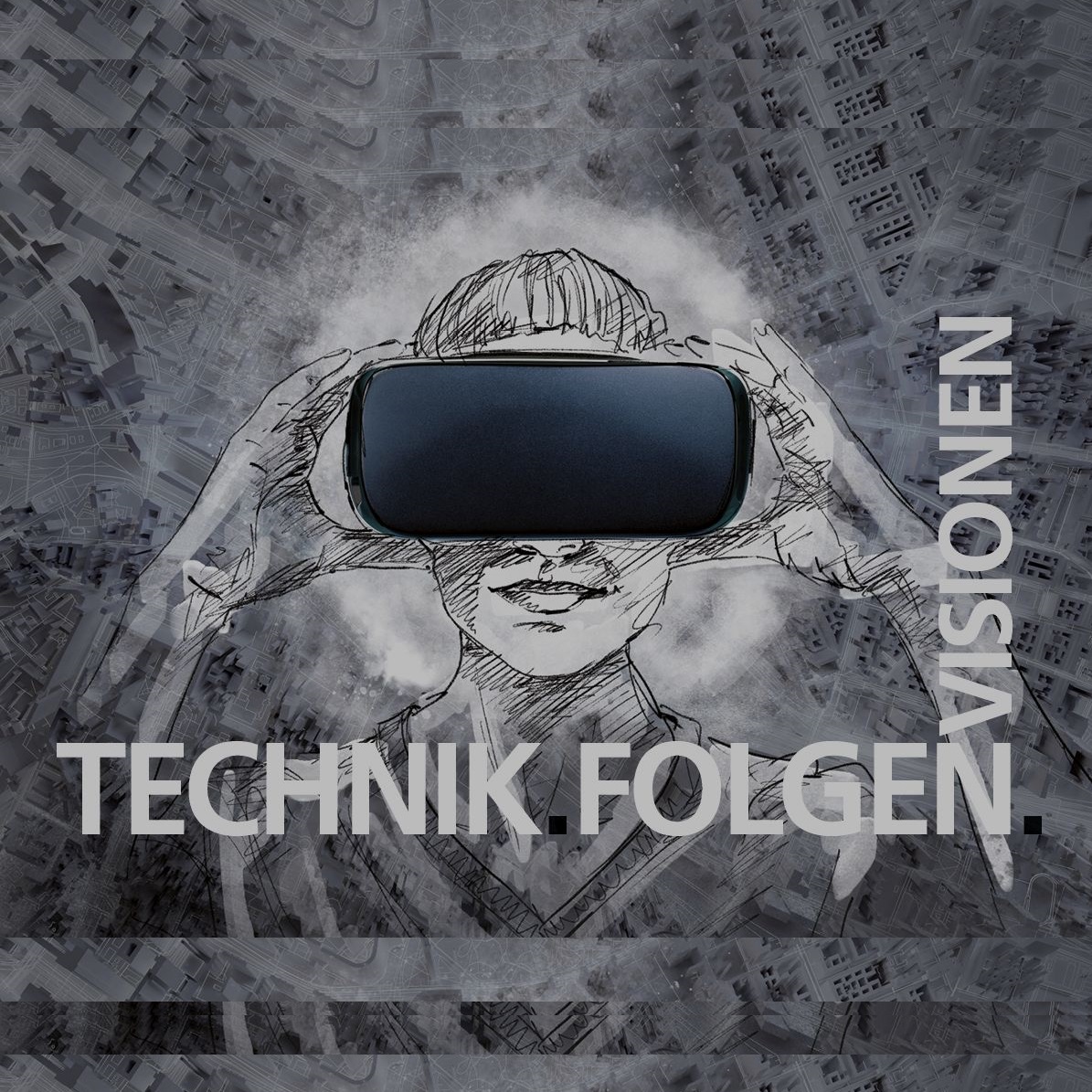
MTET contents presented in the new look KIT issue: Closing the plastics loop / 42 / Hydrogen test center / 50 / Li extraction by geothermal plants / 57 /
more